#i guess its a green country because its one of the only places where russian is spoken commonly and isnt at war/unfriendly to the us
Text
so transfixed by that map like
armenia: 👍
palestine: 👍
moldova: 👍
puerto rico: that seems too weird we have questions
#moldova isnt like that messed up atm i think but one of my professors is moldovan and says she hasnt been to her home country in years#because its too chaotic. idk if thats a privilege thing or if thats a legit concern#i guess its a green country because its one of the only places where russian is spoken commonly and isnt at war/unfriendly to the us#also look at it they specifically section off the west bank but its still in green#so i guess its chill to just go there and stay for an extended period of time
1 note
·
View note
Text
If Bombshells ever returned, maybe to explore the aftereffects of the war. Here are some superheroines and supervillainesses that could join the fight into the new era. The Cold War.
Jesse Quick; Jesse would totally join the families providing their homes to the displaced Jews of Europe while at the same time protecting her city from all sorts of crime. But her storyline might come with learning that in her need to help everyone and solving everyone's problems since she has the technology and the privlege, well... kinda appears as a white savior. At least to Lisa Snart which brings me to...
Golden Glider: Well I think we can all guess that Lisa has a Jewish-like last name and while her big bro, Captain Cold, Leonard was working with the Nazis, I am so arguing that he was just conveinately converting in order to save his skin and his sister's. Anyway with her brother in jail and Europe in shambles after the war, Lisa can travel to America with other displaced Jews. Some families were kind enough to "foster" these peoples which is where Jesse comes in. Well Lisa isn't the type to accept the "pity" and dislikes how priviliged a life, Jesse leads. Then comes a whole new yet classic Flash vs the Rogues rivalry.
Nyssa ah Gul: How can we forget another misplaced Jew. Well not Jew but Ra ah Gul's other daughter, Nyssa, whose entire adopted family died in the concentration camps while Ra was off whatevering with the Lazerus Pit. But since Ra's long gone from the picture, I suppose Nyssa will have to seek answers from Talia about why she didn't try to help her or contact her after finding out they were sisters.
Mya: Meanwhile after WWII, India is revving up for a revolution after being used and abused by the British Empire in a war they didn't even want to be in. And after being in the war, STILL treated like second class citizens. That's why Myra, prodigy of Shiva is up to lead a revolution for her people.
Gypsy: Let’s not forget about all the other groups that Nazis were prejudiced against. Cynthia Reynolds or "Gypsy" as the SS slurred against her and her Romanian family. But with Europe's landscape in disarray, Cynthia can use her earth-bending powers to help and educate people that she is more than the fortune telling, pick pocketing stereotype that the world believes.
Volcana: Now I know we didn't really get into Italy's part in WWII, but someone with volcano powers would totally be working in Italy, specifically Pompeii. The one issue is that, like in her origin story, she was working for Mussolini against her will and the Italian still wants their "super weapon" under lock and key in case of WWIII.
Thorn: Meanwhile the late 40s-early 50s is totally not a time to be woman with a mental illness. Especially when the "understanding" doctors try to lobtomize you. So Roselyn Forrest's double personality disorder is a big problem in her life. Especially since her second personality is a scythe weilding maniac and her uncle wants to put her in an institution. Added to the fact that she is still suffering under Irish discrimination. Hopefully the Batgirls can help, not only change child labor laws, but views on mental illness too.
Giganta: A gorilla turned into a girl. Why shouldn't that be an experiment by the crazy Americans or Russians in a way to beat each other as the world superpower. Well technically the Russians wanted to send a gorilla into space and beat the Americans, but they thought a woman astronaut (or as they called cosmonaut) would make them look better. (All true look up Valentina , first woman in space). But besides being part of the space race, Giganta can bring spotlight to Africa where she was born, and which is being divided by the major world powers for exploitation.
Crimson Fox: Constance D' Amis, French heiress would be part of the small army of woman workers during the YALTA conferance trying to get their say into how to rebuild Europe for the benefit of all. Who knows, maybe she even talked to Selina Delgatti. Hey French heiresses and Italian heiresses must know each other. Plus she expels hormones that can make anyone under her thrall which leads me to...
Queen Bee: Another pheromone expelling woman. A villainess though. Africa wasn't the only one being exploited and colonized. The former Ottoman Empire was being exploited for its oil and Lebenon is taken over by the French (Basically ample reason for Constance to go to Lebenon and fight Queen Bee). And the former queen is certainly not above going to the Russians to fight the US/Europe to get her country back. Or just team up with Lex Luthor to take down Supergirl and get her country back. I just imagine Lex and --- to be like an evil Mr.Darcy and Elizabeth Bennet okay. All suave, witty banter. It makes sense in my head.
Catherine Colbert: A bit like Lois Lane, Catherine is an everygirl. Well if the everygirl was a daughter of an dimplomat and had her sights on making a name for herself in NASA and trying to avoid the pressures of mysgonistic men that woman aren't fit for government. Being told that she is too emotional and should stay in the kicthen, Catherine rebelled by becoming a stone faced, cutting ice queen in the diplomacy track and also a horrible cook.
Artemis and Cheshire: I'm taking a bit from the YJ story in that Artemis and Cheshire are half-french, half-Vietnamese. Since their abusive father was loyal to the Nazis, he disowned them and cast off their Vietnamese mother in Japanese concentration camps. While Artemis made it to America and tried to stay on the good ol American democratic way (while fighting petty looters in the streets of Gotham as one does), Cheshire went to Vietnam where she works as an assasin, for the communists and the non-communists. It doesn't matter to her as long as she gets paid. But times are changing in Vietnam as the fights about communism between the North Vietnamese and South escalate.
Lady Blackhawk: Zinda Blake, hero of WWII and the Blackhawk brigade comes home to nothing. No money. No pension. No respect. Life as a veteran has no perks since no one has money to pay in Europe. Plus she'd still be trying to adjust to civilian life after nonstop combat and the inevitable PTSD while the Germany she loved is split into two. Hopefully Rudi and Helen will help to keep her in a safe place until she can get back on her feet.
Miss Martian: While I don't know whose in Harley, Ivy and Viktoria's circus, I feel like Miss Martian would find a safe haven there. While she did not experience the WWII, she did experience a similar prejudice and genocide on Mars being a white martian so I bet she can help with reprations. Or just join Starfire on the fire squad...wait nevermind. Fire is Martian weakness. Well at least have her and Starfire being alien girlfriends exploring the strange Earth world together.
Rocket: Again, haven't had the joy of reading the final vol of Bombshells United so I don't know exactly what Bumblebee has been up to nor the racism she had probably experienced. But Raquel would be in a similar boat. An African American teen in an unjust pre-Civil Rights movement society with the added difficulties of teen mom hood. I really want some spotlight on her whether she joins the Batgirls or strike out on her own or helps Icon just like in the comics.
Mercy Graves: Alongside Lex wherever he is, I want a similar debut to what Mercy did in JL. Mercy takes over LexCorps during Luthor's absence, absolutely crushes it and makes it more of a success than Luthor ever did because she is not obsessed with the Kryptonian heroes. Maybe she even teams up with Waller? Who knows? Or even have two heads, Mercy Graves and Lena Luthor, making millions and making plans, evil or no, always ending on top.
Silver Banshee: A woman whose screams causes people to age. How they could NOT use her in a war, I do not know. But I picture Siobhan's arc going something like after her family dies in battle or something or other, she taps into her genetic banshee powers. Fueled with grief/cynicsm/vengeance she travels around the Iron Curtain, causing death since death is a mercy compared to living in destitute misery.
Plastique and Roxy Rocket: One is a Canadian explosives expert, another just really, really loves rockets. Both would be very useful on either side of the Cold War. They're traditionally illanesses so I could see them as double agents like Cheshire, working for whoever pays the most for their time.
Roulette: Roulette’s big thing is gambling on illegal cage fighting activities. Well lets up the ante by having her big gamble being stoking US/Russian tensions. After all the longer the war goes on, the more she gets paid for her information on the other side, her contacts for weapons, her spies etc. She'd be rolling in dough, and loving it even when under threat of nuclear destruction.
Fire and Ice: No idea how the heck they would fit in to a post WWII world. But let's suppose they want to escape Brazil and Antartica respectively to be able to help out in the aftermath after doing nothing during the war.
Jessica Cruz and Aresia vs Star Sapphire Meanwhile with Hal Jordan out of the picture, let's have the infamous Green Lantern vs Star Sapphire rivalry again.
Lady Shiva: Street fighter, assassin, mother of the future Batwoman, Cassandra Cain. Lady Shiva must be part of the Cold War. She is bit of a anti-hero so I doubt anyone would know where her loyalties truly lie, but she'd be on the side of whoever her daughter wishes to protect.
Cassandra Cain: The new Black Bat, continue Katy Kane's work, and the Batgirl's work, and all the work that needs to be done after WWII. She's the new heroine.
#dc comic bombshells#dc bombshells#golden glider#lisa snart#nyssa ah gul#mya#jesse quick#cassandra cain#black bat#lady shiva#cynthia reynolds#gypsy#claire selton#roxy rocket#volcana#jessica cruz#green lantern#carol ferris#star sapphire#fire#ice#roulette#cheshire#artemis#plastique#silver banshee#mercy graves#miss martian#rocket#catherine colbert
25 notes
·
View notes
Photo
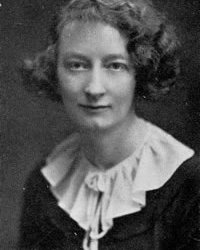
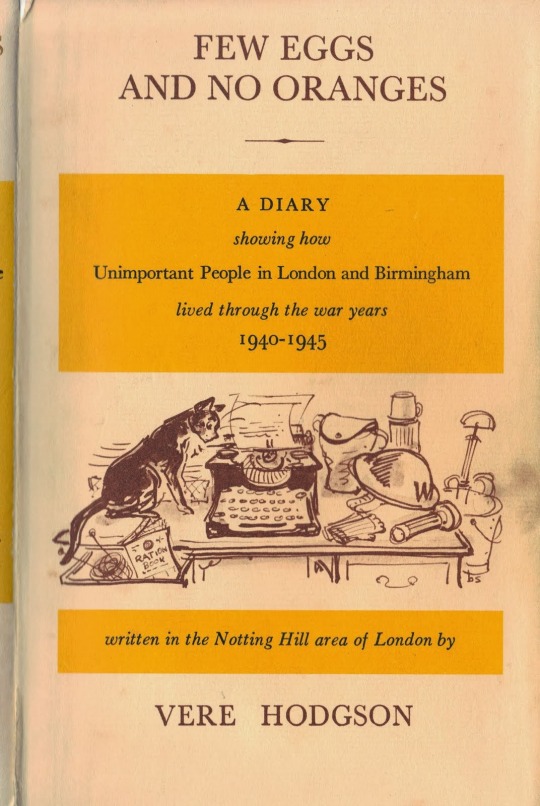

Hodgson, Vere. Few Eggs and No Oranges: A Diary Showing How Unimportant People in London and Birmingham Lived Through the War Years 1940-1945, Written in the Notting Hill Area of London. London: Dennis Dobson, 1976. Reprint (as Few Eggs and No Oranges: The Diaries of Vere Hodgson 1940-45), with a new preface by Jenny Hartley, London: Persephone Books, 1999.
Winifred Vere Hodgson (1901-1979) was born in Edgbaston, Birmingham, into what seem to have been shabby-genteel circumstances. On the one hand, after her father’s death in 1907 her mother was obliged to run the family home as a boarding house in order to make ends meet; on the other, she was educated at King Edward VI High School for Girls before reading history at the University of Birmingham. She was a niece of Thomas Vere Hodgson, the marine biologist on the H.M.S. Discovery during its voyage of 1904-6.
After graduating, she taught for several years at – wait for it – L’Istituto Statale della Ss. Annunziata, Florence, Italy, where – wait for it again – Edda Mussolini was among her pupils, and then for several more years at schools in (apparently – I’m a bit confused about this) Folkestone and Wimbledon. Deciding on a complete change, in 1935 she answered a “positions available” advertisement placed by a philanthropic body. Thus began her career as a social welfare worker, which seems to have been deemed important enough to have kept her from conscription during the war.
The organization for which Hodgson worked, the Greater World Christian Spiritualist Association, was located at 3 Lansdowne Road – still standing, this building was referred to at that time as The Sanctuary – and served primarily the Notting Hill and Holland Park areas, both of which seem to have been pretty down-at-heel at the time. They operated a night shelter for homeless women and gave grants of money and needed goods to the poor. (The Greater World, as its staff called it, doesn’t seem to me to fit the definition of a cult, so I’ll refrain from making any value judgements; you can read more about it here and here. It is still active.)
Hodgson’s job involved a good deal of secretarial and clerical work, but she also worked directly with the association’s beneficiaries as well as making nice with its benefactors. She often spent nights at The Sanctuary, either to be present for the women sheltering there or, once the war began, to take her turn as a fire-watcher. Although in her diary she always expresses gratitude for any free time she had, the job clearly brought her a great deal of satisfaction:
Went to see one of my poor old souls today. She has been getting a bit of chair-mending to do, and was better. She dreads the winter – as last year she was compelled to beg in the streets; but now we shall help her. The dread of complete destitution is terrible.
Like Clara Milburn, another wartime diarist whose output was published in the 1970s, Hodgson wasn’t writing primarily for her own benefit. Mrs. Milburn kept her diary with an eye to creating a record of the home front for her son, Alan, an officer in the British Expeditionary Force who was taken prisoner in Belgium in 1940. Miss Hodgson initially wrote for a cousin, Lucy Hodgson, who when the war began was in England on sabbatical from her job as an education officer in what was then known – to some people, at least – as Northern Rhodesia, and returned there in the Spring of 1940 “with grave misgivings,” according to Vere Hodgson’s introduction to the book.
Hodgson began sending installments of the diary to Lucy, who returned them to her and also sent parcels of cheese, tea, and other rationed foods. At some point Vere began mailing the pages to a round-robin of friends and relations, the last of whom would then send them on to Africa. (Amazingly, only one installment went missing.) Another thing that Hodgson’s diary has in common with Milburn’s is that she didn’t actually use printed diaries, allowing her to write very long entries at times.
The diary first came to public attention when Hodgson answered another advertisement, this one from the journalist Leonard Mosely, who was looking for first-hand accounts of life in wartime London as source material for his 1971 book Backs to the Wall (which is clearly something that I need to read). He quoted her entries for September 3rd, 1939, and May 7th, 1940. This resulted in a request from the publisher Dennis Dobson that Hodgson prepare an edition of her wartime diary as a whole. According to a publisher’s note in the Persephone reprint, “This she did, cutting by about three-quarters and editing substantially.” Since the reprint runs to 590 pages, one has to wonder what the original was like!
Few Eggs and No Oranges begins on June 25th, 1940, with the announcement that “Last night at about 1 a.m. we had the first raid of the war on London.” Air raids were at the very center of Hodgson’s war. She details, blow by blow, each and every raid and alert that she experienced. Indeed, she offers so much granular information on raids – where bombs fell, how many people were killed, etc. – and other topics that British newspapers weren’t permitted to discuss in any detail that it’s a wonder that the diary was never censored on its way out of the country. (At one point she reports that the censor returned to her a letter that she’d sent to a friend in Canada, so clearly this was something that really did happen! At the same time, she records many major events of the war all over the globe, seeming to assume that Lucy won’t have heard or read about them and leaving me wondering whether Northern Rhodesia can really have been that isolated by 1939.) Her preoccupation may have had something to do with the fact that she always found herself living on a building’s topmost floor: when the war began she was renting a room in a boarding house at 56 Ladbroke Road; in October, 1941 to her great delight, she moved to a “flatlet” across the street at 79 Ladbroke Road, the process of furnishing which she recounts with relish. Among other advantages, this allowed her to shelter friends who needed it: one of her friends was bombed out three times over the course of the war. To be sure, Hodgson did develop a good deal of sang-froid: “Very blitzy indeed last night,” she remarks off-handedly on January 10th, 1941.
When bombs weren’t falling, Hodgson simply recorded everyday life, often hilariously:
Spoke my mind to the cat. It is disgraceful that all the Cats have joined some sort of Pacifist Organization. To keep a cat in these awful days of food scarcity, and then have to catch the mice yourself, is a bit thick. I explained this to our animal.
As you might guess from the book’s title, food was another of Hodgson’s central preoccupations. There seem to be two conflicting narratives about food rationing in the U.K. during and after World War II. One is that pre-war Britons were overfed on a fatty, starchy diet, and that the nation’s overall health improved as a result of rationing. The other is that rationing was not only damaging to the nation’s morale, but led to widespread borderline malnutrition. Hodgson was inclined to the latter view. She repeatedly details all of the edibles she’s having to do without (fresh fruit was a major lack), either because they’re simply unavailable or, in the case of unrationed goods, because their prices have skyrocketed. On the other hand, she takes great joy in her own and other people’s ability to make whatever food could be had go further. (She writes about her Auntie Nell’s jam-making activities with obvious pride.) And whenever she had a windfall she was happy to share it.
And about those windfalls: Hodgson gleefully records each of the “gifts” of extra food she received from retailers – which included oranges that only children were supposed to get – and items bought from roadside vendors on trips out of London. It’s really quite shocking how common fiddling the system seems to have been, and how unrepentant people were about doing it:
Went for my bacon ration and while he was cutting it had a word with the man about the Cubic Inch of Cheese. He got rid of the other customers and then whispered, ‘Wait a mo’.’ I found half a pound of cheese being thrust into my bag with great secrecy and speed!
Then going to the Dairy for my butter ration I was given four eggs and a quarter of cheese!
Despite the housing and food problems she and her friends and neighbors had, Hodgson seems to have enjoyed a lively social life throughout the war, with neighbors, co-workers, former pupils, visiting relatives, and complete strangers she encountered over lunch at the Mercury Café. She saw plays at the Mercury Theatre and wrote about them as well as the films she saw. (She seems to have had no objection to American adaptations of British literature – How Green Was My Valley was a favorite – but did complain that American films were too fast-paced for her liking.)
Hodgson’s answer to the iconic question “Is Your Journey Really Necessary?” was nearly always an emphatic “Yes!” Throughout the war she made frequent trips to Birmingham to see her mother and sister (there, too, she recounted air raids and the damage they caused); to Brede, Sussex, where two more aunts lived; and occasionally to other places in search of fresh air, quiet, and a change of pace. Although she makes note of the bad travelling conditions that she often endured, she almost always persevered.
Her politics are difficult to pin down. She idolized Winston Churchill (“The bravest of us all!”), even though his policies led to the internment of a close friend, and on weekdays she read The Daily Telegraph. But on Sundays she read The Observer and The People, and once Germany invaded the Soviet Union she became a great fan of the Russians. Hodgson was also enthusiastic about Americans: she expresses equal admiration for Roosevelt and his 1940 opponent, Wendell Wilkie, and remarked that “Really the Americans seem to give the best Postscripts,” after hearing one from Dorothy Thompson in August 1941. (She seems never to have actually met any Americans, however.)
On religion, too, she is very vague. She greatly admired the altruism and sheer energy of Winifred Moyes, the founder of the Greater World Christian Spiritualist Association, and at least in the published version of her diary she never criticizes Moyes’s Spiritualist “meetings,” but neither does she ever seem to have attended one. She appears to have been only an occasional church-goer, more often listening to broadcast services. However, she did regularly read her horoscope, as well as Edward Lyndoe’s predictions in The People, and was irritated by a Mass-Observation report that disapproved of the finding that 40% of the British public had some degree of interest in astrology.
A couple of aspects of Few Eggs and No Oranges did make me uncomfortable. One is Hodgson’s enthusiasm for what could be called “air-raid tourism”: as soon as possible after learning where bombs had fallen during a recent raid she went to have a look at the damage, telling her readers about what she saw. This seems to have been a popular pastime, as she rarely seems to have been alone in her rubbernecking. People probably wanted to be reassured that others were worse off than they were, which is understandable but doesn’t make the behavior any less creepy.
And then there are the bits that brought me right up against the limits of my Anglophilia. On several occasions Hodgson mentions off-handedly, and for no apparent reason, that someone she encounters is Jewish: “Met Ivy [Croucher, an actress and elocution teacher; she’s the one who was made homeless three times] coming back from her lunch at the Grosvenor with her Jewish pupil.” Later, during a visit to Birmingham, she notes that she “got four [oranges] from a Jewish trader by spinning him a yarn.”
What exactly is the point? Did she enjoy inducing the produce vendor into actions that could easily have landed him in court? How did she even know that either of these people were Jewish? The distinctive dress of those now known in the U.K. as the strictly Orthodox would have been a rare sight at the time, especially away from London; and if Crompton’s pupil was eating at the Grosvenor Hotel, as is implied, then he or she can hardly have been Orthodox at all. And then there’s this:
Went to see The [Great] Dictator today. How I enjoyed it! Superb satire! For all its tomfoolery written with a profundity of serious purpose. The speeches of Hynkel, half-German, half-English, are there. People who understood German were even more convulsed than I was. ... The palace scenes, where Hynkel did not waste a moment, were all in the spirit of German thoroughness. But Mussolini in real life does not smile so much. All done by an East End Jew! [emphasis added]
One hardly knows what to say — other than “Wrong on both counts, sweetheart.”
When Persephone republishes a book, they don’t simply reprint it from the original, but set it into type anew. (Their reprint of Mollie Panter-Downes’s London War Notes 1939-1945 features a row of tiny U.S. flags at the top of each even-numbered page and a corresponding row of British flags on each odd-numbered one.) The original Few Eggs apparently included illustrations that aren’t in the reprint. All we get is a hand-drawn map of Notting Hill and Holland Park; while beautiful to look at, it’s reproduced here on such a small scale as to make it essentially useless. I’m slightly sorry that I didn’t try to find a used copy of the original publication.
Nevertheless, I enjoyed reading Few Eggs and No Oranges, and recommend it to anyone who’s looking for a (very long) first-hand account of the British home front.
#world war II#u.k. home front#first-hand accounts#diaries#a long post for sunday#the beta post editor is unable to handle a post of this length and complexity
4 notes
·
View notes
Text
Aisling McCrea, A message to an unknown reader…, Current Affairs (July 30, 2019)
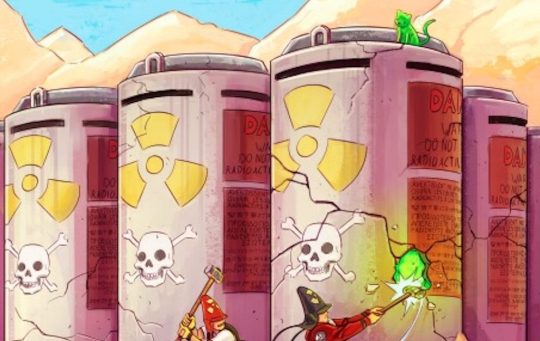
I want you to picture the following scenario: You are an archaeologist, and you are digging at a site about 125 miles east of Karachi, Pakistan. A lot of the terrain in Pakistan is mountainous, difficult to inhabit, but not the part of the land we’re talking about. Check a satellite image of the region on Google Maps, if you’ve got a phone or a computer nearby: You are in that rich green ribbon of land that snakes down through the middle of the country. This is the Indus river basin, a place that has fed and raised cultures for thousands of years. Humans have wandered everywhere, but it was places like this, with running water and fertile soil, that first lured us into the role of settler. It was places like this where the combination of bountiful resources and our growing ingenuity first allowed us to develop systemic methods of agriculture, build cities, and begin our struggle to achieve things beyond mere survival, or so it is said. Because of this, river basins are nicknamed “the cradle of civilization.” Civilization is what we call it when humans begin to think of themselves not as dependents of their environment, but as masters.
From the distance of the satellite, note that you cannot see Pakistan’s cities or factories, or any sign of activity from the 200 million people living within the lines we call its borders. All that stands out to your eye is that luscious green ribbon, swirling from the mountains to the sea, a gift from God or the earth or whomever you believe to be the benefactor. You are an archaeologist, and this is where you are digging.
The site you are excavating was only recently discovered, a chance find by a construction crew. There are many sites in the region, all dating back to the Bronze Age, but we cannot discern the exact relationship between the settlements we’ve found, whether they considered themselves part of the same culture or were sworn enemies; part of the reason we do not know this is we cannot read their writing. Therefore, what you find in your excavation might be similar to other settlements in the region—simply an extension of the discoveries made before—or you might find something different. You are full of human curiosity, and ambition. You are hoping to find something different.
Here in the cradle of civilization, you find something buried. It is a bronze box covered in engravings, clearly designed by a skilled hand, and since you found it at the center of what appeared to be the site’s biggest temple, you judge it to be of some importance. You know the field well, and you know that this is unlike anything found before, and that excites you. The engraving contains a lot of symbols—part of the script no-one can read, it tells you nothing—and under the symbols, artfully etched, is the unmistakable image of a human skull.
For thousands of years and across continents, skulls have been used to signify danger. But history is long and full of turns, and even this most obvious and literal symbol could signify a multitude of things. You trace the skull with your finger, trying to connect with the intent of its long-dead creator. It seems designed to look intimidating, but when you first brushed the dirt from the surface and saw the graven image, you didn’t think for one second about danger—in fact, the first thing it reminded you of was the skulls on your brother’s goofy band shirts. (It wouldn’t make sense to think of danger. Whatever once threatened here is quiet. There is no danger here.) What could this skull have meant, you wonder, to the people who lived here? What’s the connection to the building, or the contents of the box? You think of human sacrifices, burial places, commemorations of wars.
Then you think of your career. You open the box.
In the 1960s, the U.S. Department of Energy began wondering what on earth it was going to do with all its nuclear waste. This question had never been highly prioritized before; in the years following World War II, the prevailing attitudes towards nuclear energy had run the gamut between sunny optimism and mortal fear, powerful emotions which leave little space for mundane concerns about the high-tech equivalent of garbage disposal. After research into nuclear fission had successfully served its first purpose—vaporizing and mutilating countless Japanese civilians—the U.S. government had been enthusiastic about the many potential uses of its superhuman creation, and invested heavily both in nuclear weapons and nuclear energy production for civilian use. It was predicted that nuclear power could do everything, from keeping the lights on to preserving food. A nation drunk on the promises of the atom had little interest in thinking about the hangover.
By the 1960s, however, the novelty of the so-called “atomic age” was starting to wear off, and the government realized it had a problem on its hands. The production of nuclear energy was creating large amounts of radioactive waste, which could not be converted into safe material, and which would remain dangerous to human beings for at least 10,000 years. (10,000 years is a conservative estimate. Many scientists have suggested that number should have one or two more zeroes on the end.) The waste was being kept in temporary storage facilities dotted around the country, and there was no obvious place where it could be safely deposited and sealed away. And even if a permanent place could be found, there was the question of how to keep people away from it.
The government’s concern was not so much for its contemporary citizens, who had been bombarded with enough Cold War propaganda to understand the threat of nuclear radiation. If a 20th-century American were to somehow get lost on their way home from the drive-in theater and stumble into a radioactive waste disposal site, all it would take to warn them off was a sign bearing the word “danger” and the image of the trefoil. (The trefoil is the internationally-recognized symbol for radiation, usually black on a yellow background, a circle surrounded by three blades. You knew the image before you knew the word.) Rather, the government’s concern was for the people who would come later. For comparison, the entire concept of complex human civilization, at least as we tend to define it, is about 5,000 years old. Now we had created something that would curse us for at least twice as long as that, maybe many times longer, and we had to work out not only how to bury it, but to protect whoever might disturb its burial place.
While Americans fretted over whether their grandchildren would grow up speaking English or Russian, the Department of Energy recognized that whoever came across their disposal site might be as distant to both those languages as we are to the dead scripts of the Indus valley. It was possible that they might not know written language at all. Perhaps they would have progressed so far beyond writing that the concept would be unthinkably primitive to them. Perhaps the opposite would happen, and they wouldn’t know anything of writing because the sum of human knowledge was lost to them in some catastrophic event—or even deliberately discarded, after the sum of human knowledge was examined and found, on the whole, not to have done us any good. No matter how desperately we wish to communicate with future peoples, there is no way to guarantee the sanctity of the written word, and it is considered likely that any written warning will be meaningless to them.
Communication through images seems an obvious choice—that’s the option we usually go for when we’re facing a language barrier—until you consider that the reader might have no concept of radiation. Right now the meaning of the trefoil is recognized across nations and languages, but that meaning is just an arbitrary one that we’ve constructed for ourselves, as fragile and temporally dependent as nations and languages themselves. To us, the sight of the trefoil signifies generations of scientific progress, terror, the future, something to be respected; an invisible energy that is sometimes used to kill hostile growths in our bodies, and in other cases will make them grow. None of that knowledge is communicated through the image. To our unknown recipient, it’s just a black circle and three blades. If you forget what it means to you, it could almost be a flower.
**
If one were looking for a hint at how these sites might be treated by our distant descendants, one might find it in the deserts of Egypt. Of all the myriad civilizations that ever lived and died in the “non-Western” world, Ancient Egypt is the only one most Westerners know much about, and there are two obvious reasons for this. First, Egypt’s exoticism and long history was a great source of fascination for the Greeks and the Romans—remember that the Great Sphinx was older to Caesar than Caesar is to us—and so it has somehow been pulled into Western canon, despite its location right in the middle of the region we are supposed to think of as the West’s eternal enemy. (This view is incorrect for many reasons, not least because nothing human is eternal.) Second, they left us the pyramids. The pyramids of Giza are not the world’s largest pyramids, nor the oldest, but for the last 4,500 years their image has captivated humanity across millennia and continents like nothing else on the planet. We cannot know the intent of the pharaohs, but one might guess they wanted to be buried somewhere that would assure they would always be remembered; by imprinting their deaths physically and unforgettably on the landscape, they were sending a message to future generations.
However, while the pyramids are still here, the meaning of the message is forgotten. Most people couldn’t tell you much about any individual pharaoh buried there. Almost no-one still believes that the pharaohs were gods. Some will want to tell you their own interpretation of the intended meaning or purpose of the buildings, or their theories about the culture in general; what was once a tomb for the world’s most influential figures is now reduced to a sort of personal amusement for amateur detectives. The burial chambers have been looted countless times. We unsealed the coffins and desecrated the dead, shipping them out to museums on new landmasses and displaying their bodies as curiosities, and no rumors of a curse could slake our thirst for trophies.
Very occasionally, we have a moment of vulnerability, of self-reflection. When it was announced last year that a new sarcophagus had been uncovered, and that it was filled with a mysterious red liquid, many responded to the news with expressions of dread. Was it because we still had a little lingering respect for a culture that had achieved so much, a culture that had not quite revealed all its mysteries to us, and its production of an as-yet unknown substance filled us with awe? Were we afraid that our knowledge of science had missed something old, and abhorrent, something lurking under the sands waiting to be set free?
The moment didn’t last long. A representative of Egypt’s Ministry of Antiquities pointed out the liquid was most likely just sewage, and our discomfort promptly evaporated. Someone even started a petition demanding people be allowed to drink the “sarcophagus juice” so that they could “assume its powers.” A joke, of course, but jokes often contain a grain of truth. Across the entirety of our history as builders of civilizations, all our sins and achievements have stemmed from our metaphorical urge to drink the sarcophagus juice: to salivate at the promise of new knowledge and power, to disturb and break open anything that is unknown, to ransack the earth and, giving no thought to the consequences, consume whatever we find there.
***
By 1980, “atomic optimism” was dead, or at least dormant, in the United States. Throughout the 1970s, the anti-nuclear movement had gained momentum, along with the rest of the counterculture. A partial meltdown had just occurred at the Three Mile Island nuclear plant in Pennsylvania, stoking further panic about the dangers of radiation. There was still no confirmed plan to build a permanent waste disposal site.
The Department of Energy knew it was time to face some difficult questions. They assembled a team of experts from fields as diverse as environmental science, nuclear engineering, waste management, semiotics, linguistics, behavioral psychology and anthropology. They called it the Human Interference Task Force, and their goal was to develop a strategy to prevent any future nuclear waste depository from being disturbed by future generations. Although there was technology available to design a well-protected depository, the Task Force knew that there was little hope of building something totally indestructible. They could try and discourage interference with the depository by drawing on the concept of “hostile architecture”—designing a site that was deliberately difficult and uncomfortable to navigate—but a species that insisted on going to the Moon was unlikely to be deterred by a few spikes or a maze. Therefore, the main focus of the Task Force was not fortification, but communication. We could not keep people out by force; we could only plead.
In 1982, the German Journal of Semiotics (Zeitschrift für Semiotik) posed the depository problem to its readers, who responded with admirable, if slightly over-optimistic levels of imagination. One suggested solution was the development of a new breed of domestic cats, whose fur would change color in reaction to high levels of radioactivity. The world’s governments could then promote the development of art and literature in which cats changing color were an oft-repeated symbol for danger; thus, when future generations came across depository sites and tried to settle there, their cats would change color and they would become frightened and leave. Another suggestion was an “atomic priesthood,” a group of people who vowed to live near the sites, and passed on the secrets of radiation from generation to generation, in mythologized and ritualized form if need be. A theme that crops up again and again with the depository problem is the need for the message to be distilled into something simple and accessible: Call it universal, if you like, or primitive if you prefer.
Stanisław Lem, one of the world’s foremost science fiction authors, proposed that botanists use genetic modification to encode information about nuclear waste into the DNA of flowers, which could be planted and nurtured near the site. Although he admitted it was risky to assume future peoples would know how to decode the DNA, there was a sort of logic to it. To take plants that grew spontaneously and manipulate them to our liking, breeding and growing them at our convenience so we could propagate our own species was, after all, civilization’s first trick. Perhaps it had some lasting power.
The Human Interference Task Force began to draw up designs. A multiplicity of images, symbols and words were proposed as part of the initial blueprints for the depository site, with the Task Force noting that any method of inscribing the messages at the site would have to outlast theft, weathering, and changes in climate. Because we could not predict any future civilizations’ level of knowledge, the danger would have to be communicated in a way that was comprehensible to any type of reader. There could be some complex, technical messages at the site, but in case they couldn’t be understood, there needed to be some simpler messages too, and repeated in a number of ways so the meaning was less likely to be misinterpreted.
A 1993 report by Sandia National Laboratories—charged by the Department of Energy with the task of researching nuclear safety—took this concept further, and proposed some specific messages that might work. Some of the images might include: A periodic table. A world map of all known waste sites. A diagram showing the precession of stars in the sky over tens of thousands of years, from which readers might calculate the date the depository was built. (The places where we build depositories tend to be far from human life, and therefore relatively free from air pollution; if you want a perfect view of the night sky, go to a nuclear silo and look up.) There was some measure of disagreement on what type of pictographs to use. Some researchers wanted to focus on more functional pictographs, while others gave more prominence to “human facial expressions (horror and sickness).” The messages would begin from the outside, becoming more complex as one got closer and closer to the center. The Sandia report gives a suggestion for one of the more complex written warnings at a location close to the center. It was more technical in substance, though still simple in style:
“This place is a burial place for radioactive wastes. We believe this place is not dangerous IF IT IS LEFT ALONE! We are going to tell you what lies underground, why you should not disturb this place, and what may happen if you do. By giving you this information, we want you to protect yourselves and future generations from the dangers of this waste. The waste is buried __ kilometers down in a salt layer. Salt was chosen because there is very little water in it…We found out that the worst things happen when people disturb the site. For example, drilling or digging through the site could connect the salt water below the radioactive waste with the water above the waste or with the surface…”
The message goes on at some length, giving explanations as to the chemistry involved, the nature of illnesses caused by radiation, and the structure of the building. The writing would be inscribed on the wall, complete with instructional pictures. (Today, this scenario might remind one of an escape room or a puzzle in a videogame, amusing simulations of mortal danger made real.)
The writing would not be enough, though. The report also noted that the site would need to convey in its physical form a feeling, something that would touch the basest instincts of a living being. The authors noted in words, as best they could, what that feeling was:
“ This place is not a place of honor… no highly esteemed deed is commemorated here… nothing valued is here. What is here was dangerous and repulsive to us.
The danger is still present, in your time, as it was in ours. The danger is to the body, and it can kill.
This place is a message… and part of a system of messages …pay attention to it!
Sending this message was important to us. We considered ourselves to be a powerful culture.”
**
At the end of the Sandia report, the writers quote a poem. If you’re into poetry, you might be able to guess what it is, and maybe the lines have already whispered through your mind as you’ve been reading this article.
I met a traveller from an antique land
Who said: Two vast and trunkless legs of stone
Stand in the desert… near them, on the sand,
Half sunk, a shattered visage lies, whose frown,
And wrinkled lip, and sneer of cold command,
Tell that its sculptor well those passions read
Which yet survive, stamped on these lifeless things,
The hand that mocked them and the heart that fed;
And on the pedestal these words appear:
‘My name is Ozymandias, king of kings;
Look on my works, ye Mighty, and despair!’
Nothing beside remains. Round the decay
Of that colossal wreck, boundless and bare
The lone and level sands stretch far away.
Ozymandias by Percy Shelley was published on 11 January 1818, at the height of what was called “Egyptomania,” the burning obsession of Western aristocrats with finding and swallowing up all the treasures of the Nile. Shelley might have been inspired by the romance of the desert for his setting, but the underlying message of his poem—even the greatest empires fall and are forgotten—can also read as a warning to his own nation’s empire, to the new wave of philosophers and scientists, to anyone so caught up in the heady power of 19th-century Britain that they forgot they were only mortal. Just 10 days before the poem was published, his wife, Mary Shelley, published a work of her own, a novel about a scientist who creates a monster he cannot control.
Not many paid attention to the warnings. The allure of power—power from knowledge, from technology, from resources, from land—dominated the mindset of those who ran empires, and those who ran empires dominated the world.
The same year Frankenstein and Ozymandias were published, Egypt conquered the Arabian Peninsula. This was a critical victory, because it put the holy cities of Mecca and Medina back under the control of the Ottoman Empire, the great power to which Egypt was subordinate. The Empire had held the holy cities for centuries, yet inexplicably, for the previous 13 years, Mecca and Medina had been out of their grasp, having fallen into the hands of a small upstart tribe with their own version of Islam—an extremely strict and literalist doctrine that seemed totally at odds with the rest of the world’s tendency towards modernization. But the recapturing of the cities meant balance was restored to the world, after this strange temporary interlude. The upstart tribe with its fundamentalist religion was brutally crushed, its leaders executed, and all was in its rightful place. If one were to go back in time to 1818, and ask a well-read man about the civilizational struggles in Arabia, it is likely he would have thought a lot about the strong, old, Western-facing Ottoman Empire—which had changed the shape of the world and produced so much of interest—and very little, if at all, about a defeated family called the House of Saud.
But the path of human history isn’t a straight line, and we can’t see what lies ahead of us. 100 years later, in 1918, the world’s most brutal war ended and the Ottoman Empire turned to dust, leaving the House of Saud space to consolidate their power. In 1932 the Kingdom of Saudi Arabia was born. One of the king’s first moves was to invite American geologists, engineers, and businessmen to plunge through the sand and drill holes into the earth, suspecting that the ground beneath their feet was hiding black and glistening treasure that could make them rich.
In 1938, the Americans found what they were looking for, and the House of Saud turned from an upstart tribe to transformers of the desert, with the wealth and power to do anything they wished. Western cities grew upwards and outwards, feeding off the oil under the surface of Saudi land. In 1984, an exiled Saudi national named Abdul Rahman Munif wrote a novel about the oil boom called Cities of Salt, and when asked the meaning of the name, explained that one day the glimmering Saudi cities would dissolve and be forgotten, like salt in water. All this happened within a fraction of human history, and the finest minds of the early 19th-century could never have foreseen it—just as they couldn’t have foreseen how our lust for oil would cause the temperatures to rise.
**
The Department of Energy still does not have a permanent depository site, but it’s had a location picked out since the 1980s: Yucca Mountain, Nevada, 100 miles northwest of Las Vegas. Yucca Mountain is just by the Nevada Test Site, where nuclear weapons have been tested off-and-on since 1951 (the last test was in 2012). In this desert, workers would build mock neighborhoods of picture-perfect brick houses, sit families of mannequins at the dinner table, and see what remained of them after the mushroom cloud had dispersed. (No highly esteemed deed is commemorated here. What is here was dangerous and repulsive to us.) The location was partly chosen because almost no one lives there now, though remnants of the gold and silver mining industries have left the sands strewn with ghost towns. A lot of the names around here tell stories: Gold Center, Eureka, Saline, Chloride City, Hells Gate. Occasionally, you’ll see an indigenous name.
The Sandia report said the depository should send the message: We considered ourselves to be a powerful culture. This raises the question of who the “we” is supposed to be. It could mean the contemporary world in general, if we wanted to label ourselves one culture (we don’t know how apparent any differences would be to future readers between the United States and anywhere else.) Or it could mean the United States government. But there’s another “we” with a claim to this land. As far as the Western Shoshone people are concerned, Yucca Mountain doesn’t even belong to the federal government. The government claims to have legally purchased the land during the Civil War, when they needed it to acquire gold. The Western Shoshone dispute that the government has rights to the land, since the government only made a fraction of promised payment after it was appropriated. (This is not a place of honor.) Shoshone activists, as well as other peoples indigenous to the area, express their outrage both at the theft of their land and the polluting of the environment, but it does little good.
At any given point in time, some civilizations have power, and some do not. At the moment, the United States has power and the Shoshone do not, because in the European settlers’ quest to take the land, they had killed the majority of the people who were already there, wiping entire societies off the map as they went, whether intentionally by murder and cruelty, or unintentionally, by disease. (The danger is to the body, and it can kill.)
The Yucca Mountain plan is currently at a standstill, lacking in funding and lurking low on the priorities list, and for the moment, the permanent site shows no signs of being built. In its place, waste is temporarily being stored at the Waste Isolation Pilot Plant (WIPP) in New Mexico, which one day might become the permanent site. If the site there is developed for permanent storage, its written warnings are to be in seven languages: the six official languages of the UN, and Navajo. One might interpret this as the federal government throwing a tiny token to the people it knows it has mistreated. Or one might consider it a recognition of the impossibility of predicting history’s twists and turns: We have no idea who might be here 10,000 years from now, and who might not.
**
When reading through the Human Interference Task Force and WIPP documents—after overcoming the initial wave of eldritch horror brought on by the sight of chapter headings like “Menacing Earthworks” and “Forbidding Blocks”— one starts to get the sense that something is unusual about these reports. For starters, the sheer level of vision on display is quite remarkable, making them at times seem more like science fiction novels than a government report. What’s more, from the perspective of our era—when the humanities and social sciences are frequently defunded, dismissed, and derided—it’s surprising to see an unquestioned faith in the essential relationship between “hard” science and social science. The U.S. Department of Energy understood that the nuclear waste disposal problem could not be solved by technological innovation alone; no alloy or neat little locking mechanism would save us from our future selves. Only by examining human nature, and allowing ourselves to conceive of a world beyond all contemporary understanding, could we attempt to protect the planet from the magnitude of what we’d done to it.
Perhaps, damaging though it was in terms of its siege mentality, there was something in the Cold War mindset that allowed the U.S. researchers to think in such epochal terms. The older researchers on the initial project would have grown up in the midst of the Second World War, the near-apocalyptic battle between inextricably opposed ideologies—fascism, communism, liberal democracy—that had all still been in their cradle just a century before, and had then grown into giants, who in their battles spilled blood into the earth and left cities in shreds. The younger researchers were bathed in the spirit of the Cold War, a Manichean atmosphere wherein the fate of the earth depended on the outcome of a constant struggle between two opposing forces, and where children learned that at the press of a button in Moscow, they might one day simply evaporate. This ingrained knowledge of the knife-edge fragility of civilization, a sense of an America proud and strong and wealthy and yet always teetering at the edge of a precipice, might have instilled in those researchers a quiet understanding that they, their hometown, their country, their planet was a place where all could be annihilated. Perhaps this enabled them to look calmly in the face of their own civilization’s destruction, and accept their obligation to do whatever they could for those who came next.
After the early ’90s, reports continued to come out, occasionally, but there were no big breakthroughs in the communication side of things, or any more radical approaches to the problem. This period, after the fall of the Soviet Union, is what Francis Fukuyama called “the end of history”: the epic battles between visions for humanity’s future were done, the West had won, we were all to put our imaginations away in safety deposit boxes and get to focusing on technocratic tweaks and institutional tune-ups for the rest of time. It is remarkable to note the difference in attitude toward the nuclear crisis in the Cold War, and the climate crisis today. Moderate proposals for a Green New Deal are hand-waved away as “unrealistic”; in response to suggestions of a move to renewable energy, sensible people shake their heads and point to their graphs of electricity prices, jobs, and GDP, graphs that stretch back 20 or 30 years, which is as far back as anyone can remember. Quietly, without fuss, long-term survival slips further and further down the priorities list.
The United States understands danger in the form of external threats, but not the danger within itself: the desire of civilizations to consume the land they perch on, to draw resources out from the ground and use them all up, to create great pestilences as a byproduct of its inventions, and realize (too late) the ramifications of what’s been done. There is something different between the inventive, enthusiastic way the U.S. Department of Energy reacted to the nuclear waste problem in the 1980s, and the timid, bounded way it reacts to climate change now. We have lost the ability to imagine the future.
Our nuclear waste sits in silos, waiting for a home; the question of what to do with them is in stasis. The Department of Energy has ensured that on a technical level, when they are eventually buried, they will survive any war or terrorist attack within the short-term—which, no matter how painful they might be to us, are bound to be mere scratches on the surface of the earth’s history. Wherever their resting place—as the situation stands, it will be somewhere quiet in the Southwestern deserts—when they are buried we will probably hear about them on the news, and there may be a wave of excitement, and then the dirt will be shoveled over them, and we’ll forget. A thousand crises will come and pass. Nations will be formed and abandoned, the sea will sweep in, the deserts will get hotter, the riverbeds will dry up. To think about a time 10,000 years from now is frightening, and bleak, knowing what we know about the current trends, but a stretch of time that long has room for faith as well as despair. Hopefully humanity will save itself, somehow; we will turn our desire to shape the earth to a good purpose, and build a new way of existing on the land, something none of us can predict. We can only pray that they will not be as greedy as us. We can only hope they hear our message.
**
Somewhere beyond any distance we can picture, an archaeologist is digging. The sand stretches all around him, to all horizons. He has hit stone, a monument to something, and after some time, it is revealed in its entirety. It it etched all over with lines of different shapes, that he cannot understand, but he understands enough to realize this was once a special place. To either side of the words, he recognizes drawings of human faces: one has a mouth open in terror, the other twisted in pain. This could be a memorial to some horrific event, or it could be a curse meant to punish unwanted intruders. Intruders were not well-liked by these people, or so the archaeologist has read, though he finds it difficult to understand their concepts of property and trespass.
Exhausted from digging, he sits at the foot of the monument, and he spends a moment taking in its magnificence, trying to connect with its makers. At the top of the monolith is a mysterious symbol—a circle, surrounded by three blades. The archaeologist smiles. He has never seen it before, but it fills him with a sense of serenity. It was a plant that grew in their time, perhaps, or the insignia of a nation, or a representation of a god. Whatever it was, it’s long gone now, but in any case it’s pretty. Like a child, he traces the trefoil in the sand, digging his thumb into the earth to make the center, dragging his fingers outwards one, two, three times. The ground moves easily for him, giving way to his desire to destroy the surface and create something new. He looks down at the trefoil he has drawn, his little sign that he has been here. He is just the latest in an immeasurable line of human beings who desire to put some sort of mark on the earth.
He is proud of his creation, but he forgets that it is drawn in sand. It’s visible only for a minute, before the winds blow it away.
25 notes
·
View notes
Photo
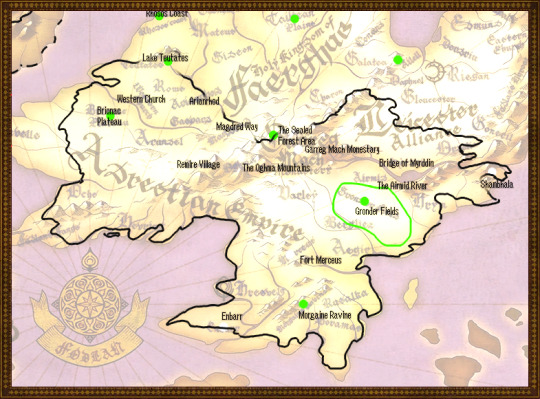
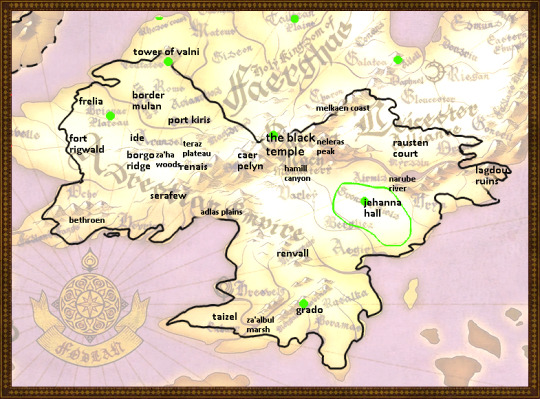
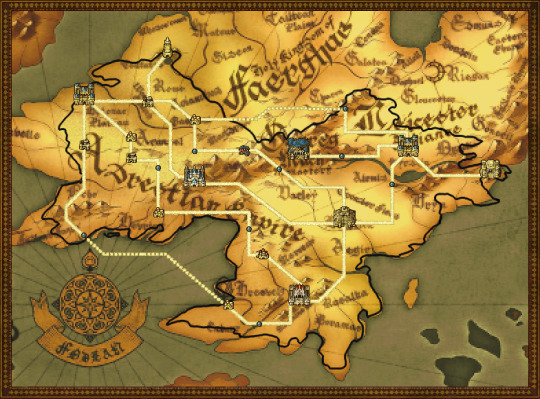
The United Fódlan-Magvel Post-Time Skip Map, Type 1
Previous Post | Next Post
-
FIGURE ONE
Figure One is simple enough, it’s just the important places in Fódlan with names on it.
FIGURE TWO
This is where it gets juicy. We’re going to go through each of these places more or less individually, so this is going to be a long post, be forewarned. Now, all of these are located roughly where they ought to be in relation to one another. Which means, in many cases there isn’t much choice behind the decision. Still, there was at least a little bit!
[Keep Reading Link Below]
North Magvel
The Black Temple
The Black Temple was placed directly on top of the ruins of Garreg Mach Monastery, as detailed in Post One. This is the site of the Holy Mausoleum, and makes a perfect one-to-one translation to the place where the Demon King Fomortiss’ body will be sealed. Likewise, Garreg Mach is located right next to the Sealed Forest, the one place in Fódlan known for, well... sealing and darkness. From the Sealed Forest will come Darkling Woods. This leads us nicely to...
Caer Pelyn
As some of you may yet be tired of hearing from me, Morva makes a wonderful Seteth. Caer Pelyn has to be near the Black Temple anyway, but there’s something terrifically poetically sad about the last Nabateans hovering around whats left of Garreg Mach.
Neleras Peak
Let’s go ahead and say that whatever disaster laid waste to Faerghus and the Alliance, it involved the javelins of light. One was sent to Garreg Mach, but, as we know, it is protected. Instead, Neleras was detonated, and left in a state of lava-y Ailell hell.
This, again, is is the only site whose location will be completely disregarded. I feel like putting it here again so you don’t have to click all around: in the lore, Mt. Neleras is supposed to be within the Darkling Woods. The Darkling Woods is centered around Caer Pelyn and the Black Temple. Now, the way I see it, you could have that forest cover all that land and still reach across the continent across two countries to where Mt. Neleras is supposed to be. You could also not do that very unpleasant thing. Just- just move it. It’s easy. Look, I’ve done it myself right here.
Melkaen Coast
It’s a coast. It’s located on a coast. Nothing special going on here.
Hamill Canyon
We’ve moved this quite a far bit. For one, a large offshoot of mountain range is no longer here in places. For two, remember that chasm Byleth fell into? Yeah, me too.
.
Midwest Magvel
Renais
Renais grew from what was left of Remire Village. Much like on the original map, it is protected on the east by mountains, which also render Caer Pelyn inaccessible from Renais.
Za’ha Woods
Now, if I were to remake this map, I’d stick the Za’ha Woods in the Sealed Forest, because Zahras is too linguistically close for me to not want to line them up.
Borgo Ridge
There is actually a small ridge on the Fódlan map right in the vicinity of where Borgo RIdge needs to go. So that was a no-brainer.
Teraz Plateau
It’s a plateau. Near vaguely altitude-y places. Not much else to say here.
.
West Magvel
Frelia
Frelia is located within range of the Brionac Plateau. You have no idea of deeply desperately I wanted to put it ON the Brionac Plateau. A pegasus-culture located on a giant fantasy plateau? SIgn me the fuck up. Anyway, Frelia is SUPPOSED to be on the coast, though. So, on the coast it goes. Why are there so many plateaus on this map anyhow?
Fort Rigwald
This isn’t located near anything important on the Fódlan map. The Magvel country borders are quite different, so it makes sense that new forts would have to be constructed. I’m still sad about it, though.
Border Mulan
On the Fódlan map, this location is listed as the Western Church. We will assume for this map that whatever they built was strong, and exists in some for or another in Magvel time. At any rate, this location is now Border Mulan.
Ide
North of Borgo Ridge. End of statement.
The Tower Of Valini
This is located on Lake Teutates. There already is the ruins of a tower there already so. Why the fuck not?
(Answer: because Lake Teutates sucks and I wish I could wipe it off the map with my bare hands. Indech do not interact.)
Visual aid for those of you who haven’t been forced to look at Lake Teutates for fifty thousand years and also never used the zoom in mode:
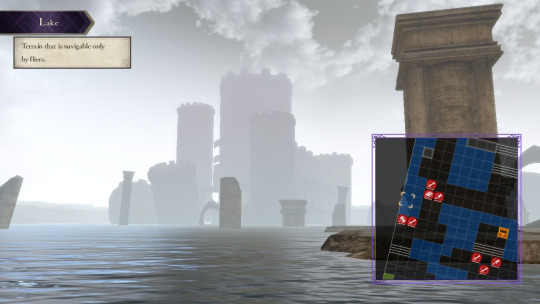
Some other interesting information about Valni/Teutates here:
Valni is Russian for waves (волны). Interestingly enough, the singular form волна is the name of a specific submarine launched ballistic missile.
The Tower of Valni is, of course, notable for having those terrifically obnoxious light beam weapons. Three House is, of course, notable for dropping actual fucking missiles on you. Missiles called javelins of light.
I’m bolding all of that because I’m very excited about it.
Port Kiris
Port Kiris is located in Magvel near the coast of the Northern Sea. I made a minor error in this map, and didn’t place Kiris far enough west. Anyway, in this map Kiris is also located at the end of a river that connects it both to Border Mulan and Frelia, which gives this town more trade power. It is a sea port and also, a river port. Hurray!
.
The Bay
Serafew
Serafew could be in a range of places. We’ve placed it in the central north of the bay. It is fed by a whole lot of rivers, which would help maintain the city from a logistics point of view. I’m guessing they have a lot of fertile land from the Adlas Plains, as well.
Adlas Plains
Adlas remains at the north mouth of the bay. There is a notable lack of Adlas’s forests in Fódlan’s map; on the other hand, there aren’t really any forests displayed on the map.
Bethroen
Bethroen’s path on the Sacred Stone’s map curves oddly; here, that is replicated and also reinforced by the mountains that back Bethroen. Presumably, here the path is curved because it is a path through the mountains.
.
South Magvel
Renvall
I really wanted to put Renvall on the ruins/same place as Fort Merceus. Renvall is also located, though, at the base of a river. There is one of those slightly to the left of Merceus. Plus, as we’ll get to in a second, Grado has a pretty set location. All of that means Renvall can’t really go on Merceus. It’s honestly the most reasonable choice, given what happens to Merceus in some of the routes.
At any rate, this is generally where Renvall goes. South east of Adlas, north of the Empire. Both Grado and Adrestian.
Taizel
Taizel is probably the one I’m least happy with. That area on both to Fódlan and Magvel map is occupied. However, in Magvel, that spot is just some town, whereas in Fódlan, its the whole capital of the empire. 800 years is a long time, but to completely wipe the importance of such a well established city? I just don’t know.
Either way, the location lines up wonderfully. As an additional note, both Enbarr and Taizel have rivers to the east of them, and this is continued here.
Za’abul Marsh
It’s a marsh. It goes both near a river, and directly between Taizel and Grado. Not much interesting happening here as far as all that goes. Fódlan provides that excellent river mentioned above.
Grado
Ah, the big one of the region. Grado is near the peninsula. It’s not directly below Renval, or Jehanna Hall, but rests somewhat inbetween the two as far as longitude goes. This area on the Fódlan map has something called the Morgaine Ravine. Now, I’ve finally finished all four routes and as far as I can tell, this fucker has come up exactly zero times. Still, it’s a place notable enough to get a name on the map, and more than that, it’s got earth-splitting connotations with that ravine name. Sounds like a perfect place to stick Grado’s capital if you ask me.
.
East Magvel
Jehanna Hall
I am so tired. Okay. Three left. So, Jehanna. I don’t know about you, but when I see a gigantic tasty fields-and-plains region, I think, what if desertification? Anyway the point is, Gronder et al. can’t stay delicious and green forever. Especially with everyone and their brother dedicated to fighting on it, or burning it down, or stepping all over it, etc. On this map, this area becomes the desert that Jehanna Hall sits itself right down in.
Now, if only I could figure out who Metis is...
Narube River
Now, strictly speaking, the Narube is located to the east of Jehanna Hall. Why be strict, though, when the Airmid is right there. I mean, its right. there.
Rausten Court
“Hey, wait!” you cry. “Where the hell did Neleras go?”
“Now hang on,” I say. “I feel like I ranted about this. I mean though I can definitely go again, here let me just get my-”
Okay, now Rausten Court
Rausten lies across the River, to the east of Darkling, and occupies its own space away from everything else, really. Of note here is that it’s right behind the Great Bridge. I think that’s pretty neat.
Lagdou Ruins
FINALLY! I‘VE BEEN WAITING FOR THIS ONE.
Shambhala. End statement.
Alright, not actually the end of statements. But let me just say: Shambhala got hit by missiles, not destroyed. If people can make it out of there, bits of that place are still intact. And that’s setting aside the fact that, if you look in the zoom in map, that place is a hell of a lot bigger than just the field of combat. Anyway. All that I’m saying: Shambhala real.
AND, lest we forget. The ninth floor of Lagdou is in fact lava-burn-y. Which could jsut mean lava... or the predictable and regularly desribed aftermath of the lances of light that Shambhala gets hit with in canon.
Anyway. All that I’m saying: Shambhala real.
Because of this, Lagdou has experienced a bit of a shift. It is still located next to all the proper geographical feature, it is just that the removal of Neleras means that part of the continent is a bit stretched.
.
Aaannnd that’s the end of this post! Stay tuned for the next post, which is just the nice final fancy map.
2 notes
·
View notes
Note
1, 3, 8, 12, 14, 18, 22, 24, 25 for the fun random questions if you want to do them?
1. Do you have any "yeah I'm good at it but I hate it" kind of skills?
Maybe?? I don't remember
3. You allowed to know everything about one highly specific topic/thing. What would you choose?
What should I do to force my country's government to let queer people have equal rights and life with others or How to get away with murder
8. Were you afraid of anything silly/irrational as a child that you're since outgrown?
Well, I was afraid to talk with people, I literally couldn't say a word and was preparing to it for a hour or more, because I wasn't socialized well I guess. Now I'm much more confident, since I'm a teacher but still don't like to "bother" people and when it's "important talk" I'm very nervous and rumbling a lot which I hate so much.
I was afraid to learning to swim because I thought I would drown, but I learned it anyway and now happily swimming :D
There is the fear that didnt outgrown but grew with me, I don't remember if I was afraid of it as a child, but now I'm afraid of places where I can't/don't know how to get help/hide/escape, like when I don't know/can't see where it ends like the sea/forest/descent (like I can be there, but when I go and go and it doesn't end or when I see how big it is and that there is nothing more I start to panic) or when it's big ass house where I'm at at first time (because I need to know where are all the exits and how to get to them, where and for what all the rooms, what people and where are they in the house and what they're doing) or when it's small space/room with one exit and nothing else. Is this PTSD? Sounds like PTSD
(I had one more fear but I forgot what was it)
12. Who are "your kind" of people?
Who aren't bigots, with whom I can talk for hours about random things or rest in silence, who will fight for each other, who are sharing the food, who don't know shit about a thing but will try to support you anyway, who smile when they see you
14. Do you have any "weirdly strong" opinions about things that don't really matter?
I may be overreacting as always but it really piss me off and I think it's racist if you "can't stand" dark skined characters in movies/series that were white in the book/story because it "goes against canon" and believe that such characters shouldn't be there because "it isn't realistic". Like. Bitch. Okay okay, you used to see/imagine the character as white, so you love it more it's fine, but it doesn't mean that the other versions shouldn't exist and that they're bad! REPRESENTATION MATTERS!!! Your imagination isn't canon, author's bigot storytelling doesn't count, you lose nothing, story isn't changing, so shut up!!! If you don't care about good representation and magic and mythical creatures are more realistic to you then people of color, then fuck you.
Also, why would you LOVE to drink cacao with water when you're not allergic to lactose and can afford buying milk?? And who the fuck cook Okroshka (Russian national summer salad with kvass or kefir) with a fucking WATER?? Huh?? What the fuck is wrong with you people. And if you're cooking borsch (national Ukrainian dish) then use fucking beets to make it red or dark purple instead of orange because of tomato paste (call out for my dad). And cucumbers make Olivie (traditional Russian New Year's salad) watery it's disgusting and carrots are too sweet. @Slav followers don't booing me I'm right.
18. If you were to add or remove one physical feature to yourself.. what would it be? Can be from animals, can be from imagination.. whatever.
Glowing eyes, ability to grow my hair whenever I want it to or unbreakable claws 'cause my nails are weak.
22. If you could only see one color (and its varying shades - dark/light) for the rest of your life.. what would you choose?
Oh man blue, green or peach
24. How do you motivate yourself to do things?
Bold of you to assume I can do it. I wanted to draw for several past weeks, but still did nothing like if something was holding me, so I just sit here and strongly hate myself :) Usually my motivation are coming deadline and anxiety but since I'm taking meds, anxiety doesn't have power over me and I don't care about deadlines at all
25. What's one of your favorite jokes? Tell us!
Suddenly I forgot every joke I ever told or liked. I love puns a lot, I like jokes about how hard final exams are, about New Year, revolution, raising of the retirement age in Russia, shitty government, corrupt police and the fight against them. Jokes are funny, but the situation is terrible. Oh and

3 notes
·
View notes
Text
Will Wood Interviews Will Wood

I’m going to be honest: I get a lot of press releases and most of them get thrown in the trash. They are, of course, entirely positive information about the given artist and therefore entirely boring. However, when I got a strange (unnecessarily big) package in the mail containing three (3) pieces of glitter, a very small gentlemen’s hat, and the following interview of Will Wood answering questions from himself, I felt it was important enough to pass along to our readers.
AN INTERVIEW WITH WILL WOOD
BY WILL WOOD
In this pre-apocalyptic wasteland of whataboutism and Russian disinformation, it can be difficult to pick all the pyrite from the proverbial pan. That’s an idiom now. In the old days, knowledge was banned and burned and buried in temple ruins and conquered libraries. It was suppressed and scarce and it took a hungry mind and a passion for discovery to shine light onto dark ages. The information age is upon us now – and while we can all tap into a bottomless well of knowledge at any time, we are no better off. The light is already so bright, the sound so deafening, that anything you have to show or say is already washed out in the cacophony. We still know nothing, because while we can see so much, we cannot distinguish illumination from illusion.
That’s what attempting to prepare for an interview with Will Wood taught me. Some information checked out, but everywhere I looked I saw misprints, inconsistencies, lies, theatrical exaggeration, errors, and the constant churning of the rumor mill. I read everything from errors in basic information, to full-blown criminal accusations. For instance, one source claimed they had found he had a home in a town called Glen Ridge, when in reality his P.O. Box is in Glen Rock, and his home is in Egg Harbor. Another source said he once kicked a pregnant woman in the stomach at a Renaissance Faire.
I like to think I prepared as well as anyone could have. Which means I prepared quite poorly. So arriving at the beach outside the B.L. England refinery in Egg Harbor New Jersey where Mr. Wood agreed to meet me had me feeling like a dead man walking. He was standing there in a bright green trench coat and aviator sunglasses, holding a steel briefcase. He greeted me with a firm handshake and a slight bow before sitting right down in the sand and lighting a hand-rolled cigarette.
Q: Do you do drugs?
A: I had a really bad trip on a low dose of antipsychotics recently. Don’t drive until you’ve adjusted to a medication. Almost ran over my own car.
Q: What are your thoughts on the affect social media has had on the arts?
A: I’m fairly certain Mark Zuckerberg technically holds the copyright to all of my intellectual property and he’s a demon lizard. But hey, that’s showbiz.
Q: Is it challenging to be openly queer in the music industry?
A: Nobody cared about my feelings until I put on makeup. I’d wear dresses more often but I’m getting paunchy from too many trips to Golden Corral. I never get my money’s worth but I always try. And the harder I try, the less its worth.
Q: So you came here from North Carolina a few years ago, what was it like making that adjustment?
A: I had to lose the accent because people kept asking me if I played country music.
Q: Do you like working out here?
A: You see that lighthouse? It’s actually a cosmetically enhanced sulfur-scrubber. It reeks of eggs for miles. I work out of a back room at Lee’s Food, which also reeks of eggs. Yes it’s a real place. Probably not for long though.
Q: And you like that?
A: Have you ever tried filing your income taxes on a fold-up card table in an 85 degree spare bedroom while eight staff members shout at each other in Mandarin while trying to make Japanese food to serve in a Korean restaurant and your daughter is running in the back door holding the neckbones of a great blue heron asking you to hold on to it while she tried to find the head?
Q: That sounds like a no.
A: I didn’t say that.
Q: What’s it like trying to raise a child? Is it difficult to juggle family life and work life?
A: Mildred is getting old enough to take care of herself. My partner and I skipped most of the ugly years where they’re too stupid to talk or eat on their own and they scream at you to pull your tit out in the middle of Thompkins Square Park. Then again, lots of people in Thompkins square park will do that to you.
Q: Okay. So. Is it difficult to juggle family life and work life?
A: You just asked me that.
Q: Right, but you-
A: We were going to adopt a little boy and name it Oliver but the orphanage thought we were being funny so they shoved a moody tween at us and lost the paperwork. But let’s not talk about Millie. I don’t like her getting attention from press, I’m sure you can see what that’s doing to Jacob Sartorius and that kid from “It.”
Q: Does press attention bother you personally?
A: Look, this is going to sound like some Sean Spicer shit. But a lot of press out there about me is just plain false. For instance, someone quoted me as liking Billy Joel back in 2015. I said a lot of stuff in 2015 I didn’t mean but I have always been a staunch Elton John man. Even though his lyrics are trash. His lyricist’s lyrics, I mean. He should just write his own, his lyrics can’t be any worse than that walking beard’s drivel.
Q: And… so, the inaccurate reporting- does it bother you?
A: Let me put it to you this way. Imagine if someone said that you liked Uptown Girl without your consent.
Q: You seem to be very critical of other musicians, you’ve been quoted repeatedly as saying “I hate music.” What makes you feel this way?
A: When you hate 99% of something, it’s most efficient and pretty effective to just say you hate that thing. A Nazi who gets along well with 1% of Jews is still a Nazi. Most of the world’s music is painfully banal or no fun to listen to.
Q: What sort of music do you like then?
A: Anything by Green Day. Everyone seems to laugh when I say that but it’s entirely true. Billie Joe Armstrong is my biggest songwriting influence and the world needs to know that.
Q: One of the defining features of mental illness is the manner in which it inhibits “functionality,” but short of suicide as a risk to one’s life its difficult to say if there’s a clearly objective definition of healthy psychoemotional functionality. We can really only work with one’s ability to reconcile their personality with cultural norms, and their own idea as to how comfortable they should feel in their own skin on a regular basis, which is also partially informed through socialization. One can cite psychosis and acute mania as definitive examples of why its necessary to consider various mental and behavioral traits as medical concerns, but its also worth noting that in some cultures throughout history hallucinations and what would appear to be delusional states have been valued and seen as sacred.
Is mental health seen as a medical problem only because social systems with enormous power have designed ways to remove nonconforming or negative natural phenomena through medical intervention, and if so, should we be more distrusting of psychiatry and the ever-changing spectrum of mental health diagnoses? Should we really call them sicknesses?
A: We only see the flu as a medical problem because physical medicine exists. Before the study of pathogens began to arise, it was simply seen and spoken about as a part of nature, and sometimes seen as divine or diabolical intervention – much like the examples of mental illness you gave. All health concerns ultimately amount to levels of social functionality, the individual’s personal experience, their mortality in extreme cases, and the illness’s threat of compromising those things in others. This is everything from cancer to the common cold – the only distinction is that we as a culture identify with our minds in ways we do not our bodies. This is ultimately arbitrary, and a socialized distinction, as the brain is a physical organ, our sensory organs are part of our mind’s subjective experience, and the body is inseparably connected with the brain as one singular organic being.
When one realizes this fully, one could likely start to see that what you are saying is true, but does not challenge the validity of the science itself. It is important to participate in this newer and complicated field of science wisely, and draw your own distinctions between problems that need medical attention and don’t, (only you can tell how much a physical injury hurts) but that does not mean that there cannot objectively be a disease. The importance of considering mental illnesses as diseases and giving diagnoses lies in our ability to communicate and interact with the topic – accurate and mostly agreeable language must be used to classify ideas and phenomenon. It was giving names to certain psychoemotional and behavioral states that first allowed scientists to organize the information necessary to invent life-saving interventions in therapy and medication. Seeing mental well-being as a medical concern the way we see physical well-being is not only accurate, but useful.
Q: Are you getting tired of writing this?
A: Well it’s good character work. World-building.
Q: Is any of what you said true up there?
A: It actually is but since I’ve made up a couple fun little things in interviews or used flowery language in the past a lot of people just assume everything I say is theatrics now. You know?
Q: I guess that makes sense. I’ve made some stuff up in my writing before too, I get it.
A: That wasn’t a question. As a matter of fact, that was an answer so you should be A and I should be Q.
A: That’s stupid. Just because you asked “you know” doesn’t mean we need to switch the only thing that identifies us in the article.
Q: Wait hold up though, my last response was also an answer, so I should still be an A.
A: Wait, so who’s going to be A, and who’s going to be Q?
A: You’re going to be Q now, because you asked who’s going to be Q. You’re the questioner.
Q: Isn’t this going to get confusing?
Q: I’m Q now too because I have to ask you if you have a better idea. Put a question mark on there so I can stay Q, that way people don’t get confused. ? Yeah right there just like that.
A: Why don’t we just use our actual initials, since it’s become less of an interview and more of a conversation? Should I be Q? It’s a response but it’s-
Q: Why didn’t I think of that?
W.W.: Oh, you did think of that.
W.W.: That’s true, I did.
W.W.: You shouldn’t have, it’s as stupid as the switching of Q’s and A’s.
W.W.: That was your idea, so we’re even.
W.W.: First base.
W.W.: THE WILL WOOD AND THE TAPEWORMS THREE YEAR ANNIVERSARY CELEBRATION IS HAPPENING MAY 25TH AND 26TH WITH A VERY SPECIAL IN-STUDIO PERFORMANCE BY WILL WOOD AT THE VERY PLACE WWATT’S FIRST ALBUM “EVERYTHING IS A LOT” WAS RECORDED! TICKETS TO NIGHT ONE ARE ALMOST GONE AND VIP PACKAGES & TICKETS TO NIGHT TWO ARE LIMITED TO GO TO WWW.WILLWOODANDTHETAPEWORMS.BIGCARTEL.COM NOW AND SEND ME YOUR MONEY MONEY MONEY MONEY MONEY MONEY MONEY MONEY MONEY MONEY MONEY MONEY MONEY MONEY MONEY MONEY MONEY MONEY MONEY MONEY MONEY MONEY MONEY MONEY MONEY MONEY MONEY MONEY MONEY MONEY MONEY MONEY MONEY MONEY MONEY MONEY MONEY MONEY MONEY MONEY MONEY MONEY MONEY MONEY MONEY MONEY MONEY MONEY MONEY MONEY MONEY MONEY MONEY MONEY MONEY MONEY MONEY MONEY MONEY MONEY MONEY MONEYVVVVVVVVVVVVVVVVVVVVVVVVVVVVVVVVVVVVVVVVVVVVVVVVVVVVVVVVVVV
Purchase tickets here, or buy them at the door at Backroom Studios.
Catherine Dempsey has no idea how Will Wood got her address. She is scared. You can follow her on Instagram.
#will wood#will wood and the tapeworms#new jersey#punk rock#cabaret punk#interview#catherine dempsey#music news
40 notes
·
View notes
Text
The Painter's Tale
Description: When a woman posing as a man is rewarded a wife, will she have what it takes to keep the act up or will her new bride find out her secret?
Chapter 1 - A Dreadful Mistake
A/N - I just started watching The Handmaid’s Tale and love it so far so here’s a fanfic for y’all, though I don’t know all the terminology yet.
Warnings - While this chapter is pretty tame, it won’t be later so if you don’t want to get into themes of rape and cults, this isn’t for you.
Rating - M

Victor punched the wall hard enough to make a faint crack in the weak plaster, his hand throbbing from the hit. In one moment, his entire life had changed, spurring a chain of events that had quickly spiralled out of control. That moment had been only a few days earlier and Victor had thought himself to be lucky enough to have avoided any change in his menial life, but nobody was that lucky. On his unfortunate day, he like many others had seen a high-speed car coming towards an old man, and not just any old man; General Harkins, one of the highest ranking ‘Angels’ of the twisted society that now ruled after the collapse of the previous one. Victor knew who Harkins was when he tackled him to the floor, saving him from the rebel car; if he hadn't, he wouldn't have bothered saving the man.
Now, Victor really wished he hadn't saved the General, though with the amount of witnesses at the time, that hadn't really been an option; if Victor hadn't saved the General, he probably would have been executed. Though, if he was being honest, execution was looking pretty good.
Ignoring his aching knuckles, Victor looked to the floor of his humble shack, picking up the letter that had caused his outburst. He had to read it properly, to know who SHE would be. His entire life after the formation of Gilead had been designed to avoid this. He managed his life as a lowly painter and decorator, keeping to himself when he could and saying as little as possible when he couldn't. Was it a lonely life? Maybe, but lonely was better than dead, or worse. One might wonder why he'd chosen a career in painting when he knew he was capable of more, but the answer was obvious to him and him alone. A low career meant a low status, and a low status meant he wouldn't be assigned a wife, though that was a privilege to most men.
Well, so much for his mighty plan. The letter was clear as day. As a reward for his act of heroism, General Harkins had pulled a few strings to assign Victor a wife. That was where the problem lay. Sure, Victor would be assigned some infertile bitch, but even infertile bitches wanted sex. How long would could he possibly hold off on that option? Probably not long. Sex would be expected of him and women talked amongst themselves; his new wife would eventually let it slip that Victor hadn't touched her. In that supposed future, Victor would be tried as a gay man, and then it wouldn't be long before the court learned what he truly was; a woman in disguise. Of course, there was still a chance that Victor would be executed after that, but it was far more likely that the Eyes would torture her, and only after the heinous act, send her to be a handmaid.
Victor, or Victoria as she was previously known, couldn't let that happen; she would rather kill herself than become a breeding bitch for some stuffed shirt who probably couldn't get it up. Yet, as much as she was considering it, suicide wasn't the most appealing option yet; that was strictly a last resort. Thinking fast, Victor took the letter to her cramped tool shed where she kept a few neglected writing supplies. For somebody of her lowly station, even writing a letter was a dangerous task, but write she did.
Governor Harkins,
I am gratified by your overly generous letter and while you offer too much for my small act, I humbly accept, though I must be bold and ask of you a favour, even though it is not my place to do so.
You see, my father has forced it into me that a man should only be with one woman throughout their life, and while I couldn't agree more, I know I cannot be truly happy without a child of my own to teach the trade of home repair.
Just like our country needs fine men like you, it also needs strong young men to maintain it and do the lowly jobs.
With that in mind, I'd like to request that my new wife be fertile, so I do not have to commit an act of infidelity.
If you cannot send me a fertile wife, then I must decline your generous offer.
Please excuse me for stepping out of my station.
Yours faithfully,
Victor Wallace.
Yes, the letter was an act likely to get Victor killed, but she had to send it anyway, knowing that one of three outcomes would occur once she did.
1 - She would be tried for her insolence and found out.
2 - General Harkins would take the offer of a wife away and nothing further would happen, other than a slap on the wrist.
3 - Somehow, against all odds, General Harkins would provide Victor with a fertile wife, but surely Victor wouldn't be that unlucky.
Anastasia wondered about the man she'd been chosen to marry; no handmaid had ever been married off as far as she was aware which made the situation all the stranger. At night, when the matrons were asleep, some of the other girls would talk and gush about how lucky Anastasia was to be rescued from the horrible fate that awaited them. Yet, Anastasia didn't feel lucky. Lucky would have been if her parents hadn't moved to America from Russia in the before times, if the before times had ever even existed; it all felt so long ago now. During the first purge when Gilead was forming, Anastasia's parents had been killed like most immigrants at the time. The only reason Anastasia had been spared was because she was young and fertile; everything Aunt Lydia said women should be. In fact, it was probably because Anastasia was a Russian immigrant that she'd been chosen to marry someone so low; after all, nobody wanted diverse genetics anymore, racist bastards.
Despite her lack of excitement, Anastasia listened to the other women jabber on about her betrothed. Apparently, he was the painter to the Red Centre that served to train all new handmaids; at least now she knew who to blame for the sparse environments of the place that tried to brainwash all fertile women. What she learned about 'Victor,' was that he didn't speak much, though that was probably to spare punishment to himself or the women. However, when he did speak, it was said that he only offered kind words. Anastasia didn't want kind words. Nor did she want to be married, or to be a handmaid, but when did women ever get what they wanted anymore?
Victor sat on the bottom step of the staircase, her hands clutched so tightly that the knuckles were white. Nobody would have guessed that the young 'man' was to be married by the end of the day, and to a handmaid no less, instead they would have probably thought that Victor was about to be sent to the gallows. Victor hadn't met her bride-to-be yet, but she was already afraid to marry the woman. All she knew about the handmaid in question was that her given name wasn't like the other handmaids. Instead, she'd been named Mary, which either meant that the Red Centre had given her that name after the beloved Virgin Mary, or the whore Mary Magdalen.
When ‘Mary’ arrived, they both had a few minutes alone together in 'the parlour' as ordered by the accompanying Aunt Lydia so they could familiarise themselves to one another; as if Victor's cramped living room could be called a parlour. Neither of the two spoke, both unsure of what was appropriate to say with the Aunt listening in from the other side of the door. Victor stared coolly at Mary, sizing her up as she did in return. Mary had dark brown hair under her habit, pale cracked lips, skin that put ivory to shame, but that all seemed fairly normal to Victor; what wasn't normal was the way Mary’s charcoal eyes held no fear, only contempt. Victor thought that all handmaids knew nothing but fear, clearly, she was mistaken. If Mary hated him as much as her eyes said, Victor couldn't tell her that she was a woman too, it was much too risky to hope that Mary would take pity and they could live as friends; Victor was screwed.
Mary, or Anastasia as she'd previously been known, loathed the man before her, not that Victor was much of a man by the look of him. He was smaller than her own five foot four, reaching only her shoulders when stood, he had carrot-red hair cut messily short, a light spattering of freckles on lightly sunburnt skin, and pale green eyes, one of which was lazy; a poor-specimen of a man indeed.
"I uh-" Victor cleared her throat, slipping easily into the deeper voice she'd crafted at the beginning of her deception, "It's nice to meet you Mary. Uh, Under His Eye."
Mary had to fight to keep her lip from curling. "Under His Eye," She greeted neutrally.
Victor was surprised by Mary's heavy Russian accent; in any other circumstance it would have been beautiful in its uniqueness. "So, uh, is there anything you'd like to know about me?"
"You are to be my husband, under God's name that is all I need to know."
"Right, I-"
Aunt Lydia walked in. "That's enough time," She said forcefully. "Now we must begin the ceremony."
To call it a ceremony was overly generous. Since Victor had little status, the wedding simply consisted of the exchanging of the new vows stating that Mary would serve Victor in all 'his' wishes, and then a piece of paper was signed, noting their marriage for the public record. That surprised Victor, she didn't think there were any public records anymore.
After that and a reading from the bible that neither Victor or Mary really listened to, they were left alone together. The night was late by that point and Mary awaited the moment when Victor would take her to the bedroom to fuck. Victor felt the seething hatred filling the room again; it was claustrophobic.
In an attempt to break the rising tension, Victor spoke plainly, "What's your name?"
"My name is Mary."
"No, not your given name, your real name, from before."
Mary frowned. Was Victor testing her? She couldn't tell. "It's not important."
"Please."
The sincerity in his voice made Mary reconsider. Perhaps Victor wasn't as strict as everyone else, it would be better to be married to someone like that, someone without a stick up their ass, "Anastasia."
"It sounds nice. I um- It's late, we should go to bed."
Anastasia went back to her steely glare; so, he was just the same as every other man. Fine. She was at least prepared for that. She followed Victor up the creaky stairs of the shabby apartment wondering how a professional decorator could let his own home lapse into such disrepair.
The bedroom was just as pathetic as the rest of the house, its only feature being a double bed that at least looked comfortable; not that she was going to be comfortable for the next ten minutes or so, if Victor lasted that long.
"This is the bedroom," Victor led the way in.
Anastasia held back a snarky, 'Obviously.'
"My work room is the door before it... That has a sofa in it so I'll uh, be sleeping there for a while. Give you some time to settle in and all that. If you need anything... don't hesitate to call on me." Victor let himself out awkwardly, "And uh, I'll get you some wife clothes tomorrow."
Anastasia watched him shuffle away, more confused than she had been during Gilead's founding. Either Victor was gay, or something was very wrong in this house. She knew he'd asked for a hand maid so why didn't he want to use her for what she was for. Maybe he was impotent, God she hoped so. Either way, she would do her best to discover what was going on later; for now, sleep had never been more inviting.
16 notes
·
View notes
Text
A Very Commie Christmas
A/N: Pure fluff. Alfred has Seen Too Many Things(TM). And fluff again. Enjoy.
Notes: vesnushki = freckles in russian. @derevosky wonderful idea for a cute nickname, thank you for letting me use it and give it the acknowledgement it deserves! Merry Christmas to all!
“Alfred.”
“A minute!”
“I thought you wanted this to be “quick and painless”?” Ivan shot up the stairs.
There was a soft curse before Alfred appeared at the top of the stairs, wrapped in probably all the winter clothing he had packed - a scarf, a long and thick coat (Ivan knew he was wearing at least two shirts and a jumper underneath), jeans (and probably tights under, but Ivan doubted Alfred would admit to them), his favourite and only pair of earmuffs and the mittens Ivan had bought him the year before. “Yeah, but I couldn’t find my scarf. And it’s friggin’ freezing. Arthur always rearranges my stuff when I unpack, blame him.” He fumbled through his coat pockets, the mittens making his movements clumsier than usual.
Ivan reached over to dig through Alfred’s pockets, found his key and unlocked the door.
Alfred huffed, already miffed at the cold weather. “Let’s go,” he said, before stepping out. Ivan caught the umbrella from the doorway, knowing that they’d been promised rain or hail or snow - or a combination of all. They hurried their way to the metro station under the grey sky (Alfred wanted to sprint, Ivan was leisurely walking behind him), and from there went to the city centre.
After Ivan managed to convince Alfred to leave the warmth of the Underground, because we have business to tend to, Alfred, they came out into the cold London winter - and rain. Actually, it wasn’t even proper rain - it was an annoying wet mixture of snow and rain. Ivan managed to get the umbrella over them before Alfred could begin moaning. Ivan would never understand how despite Alfred having areas in the north (not mentioning Alaska, where Alfred was known to usually spend a week in during winter), the man would whine at the first hint of cold weather - be it in Russia or Britain or anywhere.
Brompton Road was hellishly busy, and the more they navigated through the crowd of bustling people, the more the both of them dreaded their day’s plan. They’d only arrived in London the day before for Arthur’s annual Christmas party (dubbed by Alfred and Matthew as their “ex-Empire dad’s yearly where-have-my-colonies-gone gathering”), and now had to go Christmas shopping. Neither had had the foresight to do it in their respective countries, and now were forced to settle for the Sunday rush of Christmas shoppers in Harrods.
Alfred had began going on and on, most likely about things they needed to buy - although when Ivan listened closer, after distinguishing the sentence, “Matthew’s a complete dick with his whole Bombardier deal, he keeps bitching about the tariffs he brought onto himself!” he really had no idea what Alfred was speaking of.
It wasn’t long before they arrived to the grand and lavish department store Harrods, and Ivan felt an immediate sense of being overwhelmed by the sheer amount of people and light and things there were. Alfred was already halfway through taking off nearly every layer of warm clothing he had on himself, having removed his coat, his jumper, his gloves, his earmuffs and his scarf.
“Okay, we’re here. Where do we start?” Alfred asked, and Ivan dug into his pocket for the list Alfred had made of presents and things they needed to find. Ivan handed the list to Alfred, who began reading off it and explaining where they’d find things. At one point, he paused. “I’ve been here too many times if I can list off every floor this easily. C’mon, let’s go, let’s start from the top and go down from there.”
Of course, it was a journey in itself, navigating the ground floor between the different islands of makeup and beauty products, Ivan somewhat astonished at the sheer number of different shades of lipstick and blush that were there - there was no way that many colours could even exist. (Once he saw the first hint of blue lipstick, however, he gave up trying to understand people’s tastes - if that colour had been produced and marketed, it had to sell.)
“Ivan, come on!” Alfred ushered, trying not to go too fast for fear of losing Ivan - though losing a six-foot-too-many-inches-tall Russian guy in the middle of a sea of Brits wasn’t too easy a task. They reached the elevators, by which point Ivan seemed somewhat out of breath already.
“Is this all really necessary?” he asked Alfred in the over-crowded lift.
“What do you mean?” Alfred’s eyebrows had that small confused arch that was so very characteristic of him. “What’s necessary?”
Ivan shrugged. “Merely that this all seems… rather excessive.”
Alfred paused. “Uhm… sure? I don’t know, seems normal to me. It’s a bit busy here today, that’s all.”
“I meant the amount of… things here. Products. How many shades of lipstick do they need?”
Alfred laughed. “The people who come here are usually pretty stinkin’ rich, and British. They need seven shades a day, and another one for special occasions.”
Ivan smiled, and they rode the elevator in silence to the fifth floor. Alfred deemed Matthew in need of some new sportswear, and Ivan was finally told the relationship between Matthew’s Christmas present and the US tariffs on Canada.
“Matthew’s bitchy over the stupid planes or whatever, so I’ll bet it’s because he broke his favourite hockey stick or something,” Alfred explained.
Though they didn’t get a hockey stick, they managed to find a nice hoodie for Matthew - even though Alfred claimed Matthew already had too many, but he’d been once told by the Canadian: “What does too many hoodies mean? That sentence doesn’t exist.”
“Ok, now we can skip the fourth and go straight to the third floor - that’s where all the cool stuff is. Trust me, Britain doesn’t get much cooler than the toy kingdom or the tech section here,” Alfred told Ivan, before grabbing his hand and dragging him to the escalators.
The thing was, it wasn’t just any escalators in any random department store - this was Harrods. Alfred said it was called the ‘Egyptian room,’ but Ivan was confused as to what part exactly he was supposed to look at. When he focused, he could make out the Ancient Egypt-like diagrams, patterns and hieroglyphs on the beige “stone” walls, but it was rather confusing - the colourful artwork was crowded by Christmas lighting, white frivolous decorations serving as support for bright yellows, blues, reds, purples and greens. It was colours galore, and having never been to Harrods before, the extravagance of it was rather off-putting. Combined with the crowd of upper-class Englishmen and women, the overall effect it had on Ivan was… perhaps not the best he could have had.
Alfred went on about their next steps. “First we’ll stop at Toy Kingdom, because there’s always the coolest things ever there, and also I’m pretty Jett and James want something from there - oh, and Peter too, and then we’ll walk around the furniture place if we can find something nice… Even if Arthur probably just wants tea, he also really needs a new couch-”
“You are not buying him a new couch, are you?”
Alfred laughed. “No, but I might just buy him a new carpet or small table or pillows that doesn’t match his couch and Francis will force him to change it. Francis hates that couch more than I do.”
They got off the escalator, and Alfred steered them to the furniture section. There were more couches, more tables, more random decorations than Ivan cared to count - and the place seemed to continue for multiple hallways. Alfred continued speaking, happily drifting through the different displays and pointing out things that caught his attention (granted, many things managed to catch his attention).
“Oh, and Francis is coming too, I forgot - I guess we gotta get him something too, seeing as he’s, like, a second dad to me or something, so d’you think he’d like incense? Or maybe some cologne. Although he probably has loads of those. Or a new tie, which is a classic - oh, hey! He had that new fancy suit, I’ll bet he wants a new tie, wasn’t it a kinda blue-kinda-grey shade? I think he’d like a nice tie with that - how ridiculous ties d’you reckon we can find?”
A rather nice coffee table caught Ivan’s attention, but when he turned the tag to show its price, his eyebrows shot up. “Isn’t this place somewhat… expensive?”
Alfred turned to him. “Well, yeah. That’s the point. It’s the most famous department store in this entire country - okay, actually, in probably the entire world? Also the stuff they have here is like prime quality,” Alfred explained.
Ivan looked at the price tag again with an almost - could Alfred call it disdainful? - look on his face. There was a very distinct pause in Alfred’s mind, and a few select memories of his decided to appear right then and there.
He knew that look, and if it was anything to go by, he would be haunted by a ghost and today would not be enjoyable.
No, that was irrational. He was overthinking it.
However, as predicted, the trip didn’t turn out much better than it had started.
It didn’t matter whether it was in the toy section, where Alfred showed Ivan the cool robots and other toys that were there, or whether it was in the tech section, or in the artwork section, or the menswear, but everywhere they went Ivan threw around certain questions that made Alfred doubt the entirety of his life for the past twenty or so years.
“Have you looked at this price?”
“I could have a suit tailor-made at home and it would cost a quarter of this.”
He could swear he heard Ivan mutter, “Bourgeoisie,” with an exasperated look on his face, at one point. Alfred had half a mind to tell him to let the rich people be.
The look of amusement, confusion and (dare Alfred say it?) derision at the number of people, the number and variety of products, and especially at their prices never left Ivan’s face.
Ivan was, as far as Alfred was aware, still a goddamn capitalist country, yet he had to make a scene about the place the likes of which Alfred hadn’t seen Ivan pull before. And he was not appreciating the flashbacks he was getting.
And the moment Ivan scoffed at the price of a golden bluetooth speaker in the shape of a bulldog with sunglasses, Alfred decided he was glad they were in Europe and that he was legally allowed to drink, based on his ID. He felt in need of a strong Guinness right then and there. Ivan turned to Alfred, and his face turned to outright confusion.
“Alfred, are you alright?”
Alfred blinked. “What?”
“You look rather pallid,” Ivan stated, and Alfred tried to squash the memories of a certain communist scoffing at the “decadent capitalist society” from popping up again.
“I’m fine,” Alfred huffed. He did a quick mental checklist, and upon realising that they had everything they needed and came here for, he announced, “We’re going to a pub.” Alfred had seen enough capitalism for one day.
It was a small problem to get their coats and scarves and other winter clothing back on before going outside, but they managed it. Alfred had been silent pretty much the entire time after leaving the building, with a look as if he’d seen a ghost (which Ivan recognised easily from their horror movie evenings).
As they made their way out and through the streets, the fresh air seemed to help Alfred recover somewhat. “Arthur told me about this place down a few streets that’s pretty good or well-known,” Alfred explained as they drew away from the busy Brompton Road. “It has this really English name too, something like Lion’s Mane or Head or something.”
They turned another corner, and arrived in front of the place.
Warm air wafted onto and around them when Alfred opened the door, bustling in with his shopping bags and all. Ivan followed him, until Alfred paused and huffed. “It’s completely packed. Let’s try that other place along the way.”
It turned out that, in the end, every single pub managed to be completely overloaded, and they resigned themselves to returning to Arthur’s home.
When they walked in, the house was still empty - Matthew hadn’t landed yet, and Arthur (and by extension, Francis) were probably still at Downing Street - Francis had decided to tag along solely to “irritate” Arthur (Arthur claimed that was Francis’ aim, despite everyone knowing that was a blatant lie, but no one deemed it necessary to call him out on it).
After having shed every single additional layer of clothing and dropping off their bags in their respective - separate - rooms (Arthur had made precise and careful arrangements - ‘no international scandals under my bleeding roof’, to which Francis had choked on his wine while stifling a laugh), they went back downstairs and Alfred promptly beelined for and crashed on the couch, Ivan following suit.
“Boy, was that an experience,” Alfred sighed.
Ivan readjusted himself, and so did Alfred. He was now fit snugly under Ivan’s arm and against his chest, his body sprawled along the couch’s length and his legs hanging over the armrest, while Ivan sat at the other end.
“What do you mean?” Ivan asked. “That was not so horrible as I imagined, just somewhat excessive for my tastes.”
“Somewhat?” Alfred craned his neck to look Ivan in the eyes with disbelief. “Dude, I literally saw a ghost walking right up alongside me in there!”
“A ghost?” Ivan’s voice was laced with amusement, the same kind a parent would use at a child’s fantastic adventure stories.
“Hi, yeah, throwback Thursday to the Soviet Union - dude, you’re a capitalist now, you’re supposed to live in places like these!”
Ivan laughed. “I do not think that’s quite how everyone else perceives capitalism.”
“Whatever, man, that was a scare you gave me right there.” Alfred paused. “A red scare, actually.”
He felt Ivan momentarily stop moving, barely breathing. Then there was a shift, and Alfred was shoved off of Ivan and left to drop back onto the couch.
“That was terrible, Alfred,” Ivan huffed, but there was a clear hint of a smile on his lips as he went to the small, old chest in the corner of the room, where Arthur kept all his blankets folded up neatly.
“That was a great pun! And you totally deserved that!” For that, he earned a blanket to his face, and Ivan then came back to the couch.
“I ‘totally’ did not,” he countered as he began poking Alfred to shift aside to let him fit. Alfred refused to sit up, so Ivan settled instead for lying next to Alfred on the couch. It was rather a tight fit, what with two grown men on a normal-sized couch, but neither seemed to care.
“Totally did, for scaring me like that. I don’t like ghosts.” Alfred yawned, and Ivan flicked his nose gently.
“We all know that, vesnushki,” Ivan said, laughing softly at Alfred look of affrontment.
“Whatever. I’m dead tired right now, so maybe we can just chill here for a bit until they come back or til Mattie arrives,” Alfred suggested. “You’re real warm and comfy and this is nice,” he continued, melding his body next to Ivan’s and nuzzling into his chest. The blanket managed to mostly cover them both, especially when Alfred tangled his legs with Ivan’s and hugged him closer.
“That is a very attractive idea.” Ivan began stroking Alfred’s hair, before removing Alfred’s glasses, reaching behind and placing them on the coffee table. Alfred let out an appreciative hum, and he sighed in content.
There was a moment of silence. Alfred interrupted it. “I hate this couch.”
Ivan chuckled, before petting Alfred’s hair. “Shush. I thought you wanted to take a nap.”
“Well I didn’t say that, but now you mention it that sounds great.”
“OI, ALFRED!”
“Sometimes I do wonder how you are not already deaf, with the amount if yelling you do,” Francis sniffed, brushing snow off his coat before hanging it into the hallway.
“He was supposed to get the ham, and I want to make sure that I didn’t buy this ham,” Arthur said, lifting the bag in his hand, “for nothing. He would be forgetful enough to not do what I specifically asked him to.”
They heard footsteps coming down the stairs, and in came Matthew.
“Oh, Matthew, you’re he-”
“Matthieu, mon fils!” Francis interjected, giving him the customary French cheek kisses.
“Yeah, arrived an hour or so ago.”
Francis turned to Arthur. “Alfred must still be out with Ivan-”
“Oh no,” Matthew smiled, a cheeky and devious grin that both Europeans knew bode nothing good. It was the same smile Alfred had worn before his Easter prank (also known as the reason why rabbits and screwdrivers - both tool and drink - were no longer allowed at meetings). “He’s here all right. Both are.”
“That lad needs to learn how to respond-”
“Don’t think he heard you,” Matthew stated.
“I think Paris heard him,” Francis said with a confused tone.
“He’s sleeping on your couch - well, more like on Ivan on your couch. It’s sweet. I have a lot of blackmail and prank material now.”
Arthur rolled his eyes and stomped to the living room. Sure enough, Alfred had mostly climbed on top of Ivan, huddled under the blanket. Ivan’s arms were holding Alfred tight, one hand around his body and the other in his hair.
Arthur leaned on the couch armchair. “MR. JONES AND MR. BRAGINSKY!”
Alfred jerked up, simultaneously somehow managing to shove Ivan off the couch. And seeing as he had been on Ivan, he ended up on the floor too. There was a panicked screech and a groan, before Alfred stumbled up from the floor.
He turned around, and seeing Ivan rubbing his back where he’d landed with Alfred on him, Alfred offered his hand to help him up. He only then seemed to realise he’d been woken up, and turned to see Arthur’s deadpan expression.
“Did you get the ham?” Arthur asked.
Alfred blanched. “I… uh - I mean, I meant to?”
Matthew was laughing in the background, while Arthur rolled his eyes. “Thank God I knew I could trust you to be that forgetful,” he muttered, before going to the kitchen.
“It’s Ivan’s fault! He scared me with his whole the-Soviet-Union’s-back act!”
“Al, please, that’s sad even from you.”
“I was scared!”
“Well I can believe that, seeing as you needed your Russian bear to comfort you, eh?” Matthew asked, pulling up a photo on his phone and showing it to Alfred.
“That’s - no - what is that-”
“It is a picture of you and me, sleeping on the couch,” Ivan explained. “Have I told you you look adorable when you sleep?”
“Let them be, Matthieu,” Francis interjected before Alfred could begin sputtering. He swung an arm around Matthew and directing him away from the other two. “L’amour is sweet, and should be allowed to have its course. That includes naps,” Francis concluded.
And as Alfred whirled around to huff at Ivan, Ivan simply wrapped his arms and himself around Alfred, and pulled them both back onto the couch.
Ivan sighed contentedly as Alfred wriggled around. “Shush, now, it is Christmas and the both of us should just enjoy the peace and quiet-”
“Francis get your bloody hands off that!”
“- of the holidays.” He felt Alfred snicker in his arms, and he smiled.
“You’re a big sap, you know?”
“Only for you, vesnushki,” Ivan smiled and kissed Alfred’s hair, and felt him burrow deeper into his arms. It was set to be a wonderful and lovely Christmas.
#rusame#christmas#holiday fic#fluff#pure fluff#aph russia#aph america#my writing#aph canada#aph england#aph france#december dragon this is all your fault
88 notes
·
View notes
Text
Essential Avengers: Avengers #169: If We Should Fail -- the World Dies Tonight
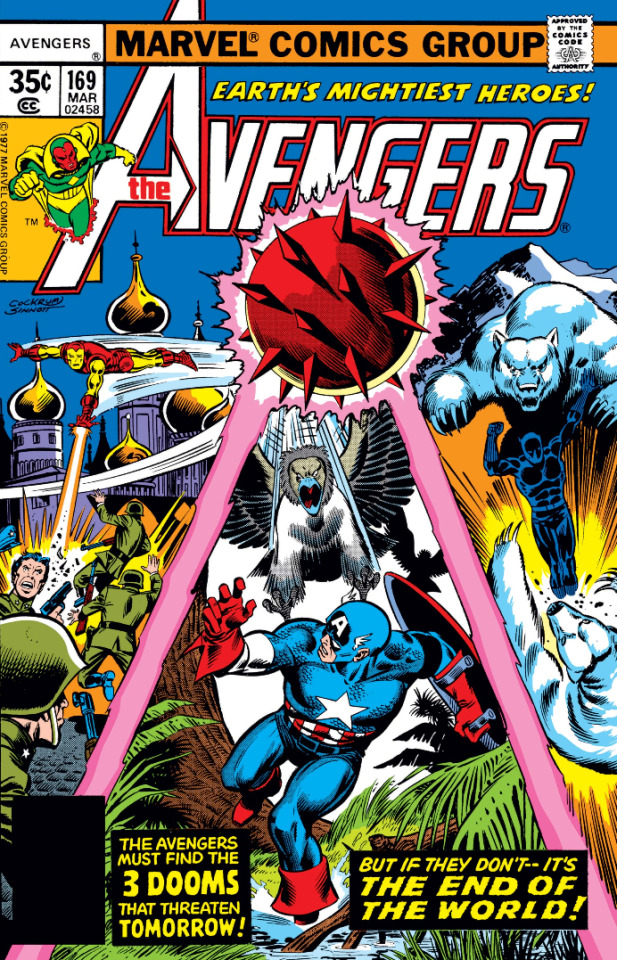
March, 1978.
This is a bit of an odd duck.
As I’ve mentioned, its a filler issue.
It only features Captain America, Iron Man, and Black Panther.
The cover is neat though. Three dooms so the spiked ball pink energy sort of separates the cover into a sort of triptych of the situations where I guess these three Avengers are looking for the three dooms.
Since there’s no last time context that will make this make any more sense, lets get into it.
We start with Iron Man doing a crossword while Captain America and Black Panther help him, moodily.
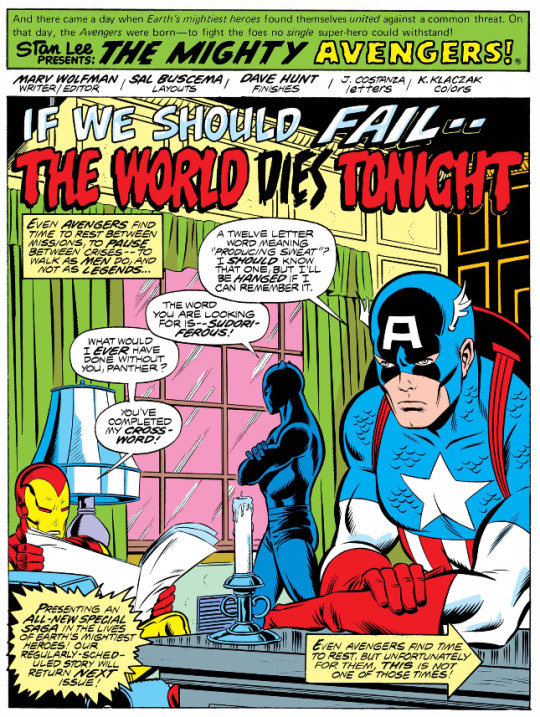
Considering that they’re enjoying some downtime, they don’t seem to be, well, enjoying it.
So maybe its no great loss after all when the wall explodes and a green-armored man stomps in promising the Avengers a battle to the death!
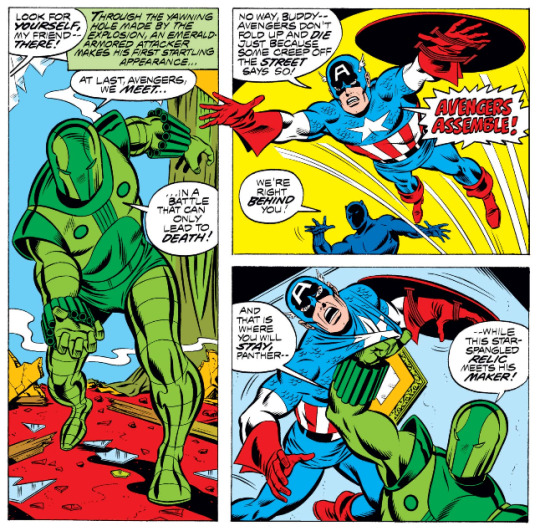
The battle doesn’t start off great for the Avengers. Perhaps because of poor planning.
Cap jumps at the guy and just gets grabbed and thrown. Iron Man rushes straight at him and gets multiply missiles for his haste. Black Panther grabs him but the dude can heat his suit up to two hundred degrees.
Also, apparently the green armor is a hyper-suit that this intruder spent millions on.
The Avengers get their shit together and start attacking in unison, managing to get some repulsor and mighty shield hits on him.
But then things get... weird.
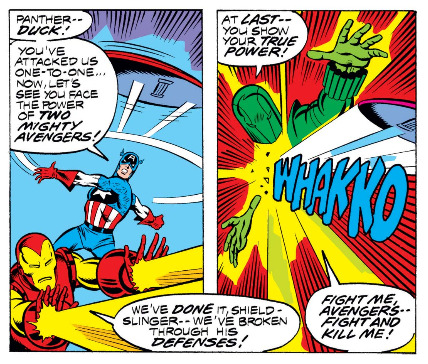
And a bit uncomfortable.
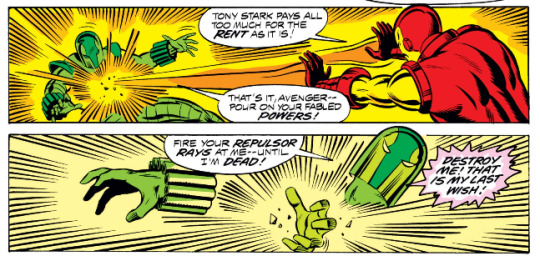
The guy starts shouting stuff like “Fight me, Avengers -- fight and kill me!” and “Fire your repulsor rays at me -- until I’m dead! Destroy me! That is my last wish!”
The Avengers realize that there’s more going on here and presumably suspect that they’ve been duped into aiding some guy’s suicide by Avenger or extremely niche fetish.
But since the guy will kill them and is breaking their mansion in the meantime, Iron Man knocks the wind out of his sails with some sustained repulsoring.
Iron Man unmasks the stunned aggressor and discovers... JASON BEERE!?
Well, we don’t know who this is but Iron Man recognizes him. Beere is one of Tony Stark’s major competitors.
So what is this all about? Some extremely niche fetish?
Jason Beere: “Because I am dying... because, when my heart gives out -- when I breathe my last -- I -- I want the world to die with me!”
And then he passes out. Because he’s dying.
Iron Man flies Beere to the Stark Industries Flushing plant and tells the Avengers to meet him there.
And by Avengers I mean Captain America and Black Panther.
I don’t know where Thor, Wonder Man, Vision, Scarlet Witch, Yellowjacket, Beast, or the Wasp are. Probably at the opera.
Anyway, to save Beere, Iron Man uses a spare chest plate and an artificial respirator to keep him alive.
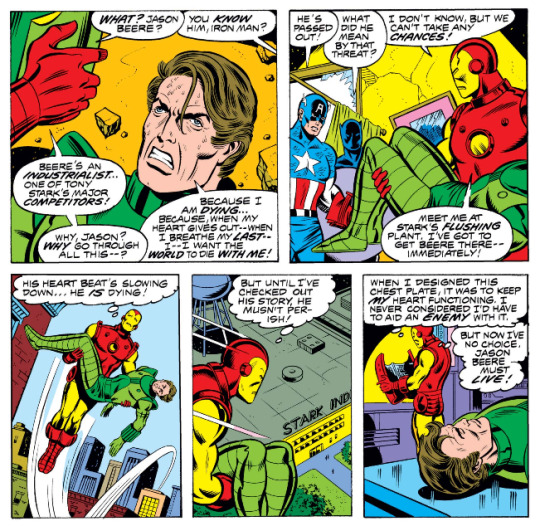
When Cap and Black Panther arrive, Iron Man tells them what he’s learned... somehow.
Iron Man: “Listen, Beere’s a megalomaniac -- he’s planted four bombs somewhere in the world, and they’re all set to explode the moment his heart stops. They’re neutron warheads, powerful enough to obliterate all life on Earth. Friends -- simply said -- Beere wants to take us all with him when he goes!”
Wait, four bombs? Then why three dooms? Cover, you’ve lied to me yet again!
Anyway, maybe Iron Man visited Beere’s office after temporarily saving Beere’s life but before Cap and Black Panther showed up. Because as Cap parachutes into Peru, he thinks to himself about the information they got from the notes in Beere’s office-safe.
For example, the location of three of the bombs.
And that Beere’s wife left him and took the children the previous year.
And how to disarm the bombs.
Anyway, this filler has chapters because. So:
Chapter 2: The Temple of Winged Death!
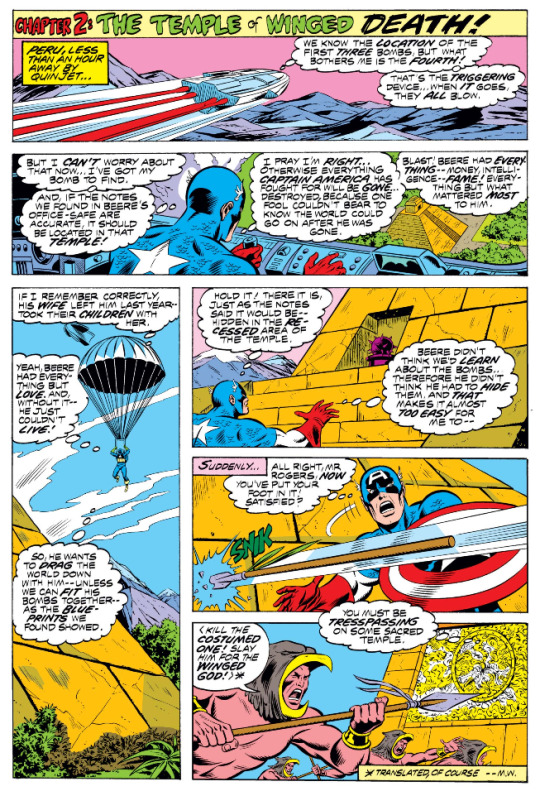
Cap just finds the first spiky orb neutron bomb chilling out in an alcove of a Peruvian pyramid.
Its not even hidden. Its almost too easy.
Oop, spoke too soon. Cap aggroed some locals.
Now these bird helmed fellows are just defending their sacred temple but Cap is trying to save the world. Its one of those unfortunate ‘smoking gun’ things that fiction sets up.
They also don’t speak English so he can’t communicate with them and since he dives in punching and also swivels one of their number into the path of a poisonous dart attack, I don’t think they’d be too keen to listen to him.
Seriously though, Cap? Dick move.
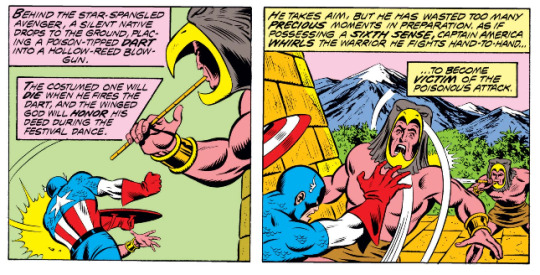
You have a shield.
I mean, sure, they have a cure for their own poisons so the man will live. Provided someone gets the cure to him in time.
That’s how Cap justifies it to himself anyway while patting himself on the back for not being a killer.
I’m being uncharitable.
Anyway, the priest or perhaps falconer of the tribe shows up. He can speak English.
And it transpires that instead of just defending their land, they were paid by Beere to kill Captain America should he show up.
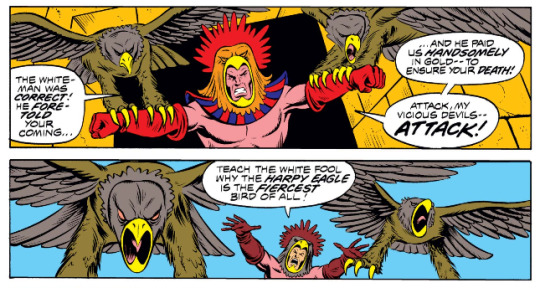
For shame, comic. Turning the bird hatted people into evil mercenaries to justify Cap’s invasion of their territory and indirect poisoning of one.
This does raise questions though.
Beere evidently knew that the Avengers would find his bombs and made contingencies for it. He also knew that Captain America specifically would go for this bomb. And I guess knew that only three Avengers would be in this issue and that they wouldn’t bother calling others.
Truly an unique mastermind, this Jason Beere.
Anyway, Cap swings from a branch, uses some bees to attack the sacred harpy eagles, sproings off a branch, nabs the neutron spike orb and flees for his Quinjet.
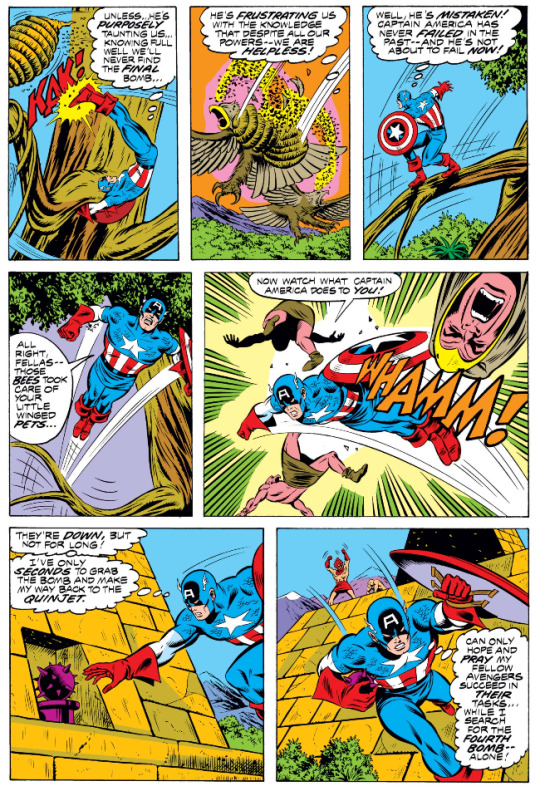
Because putting most of your points into Acrobatics works.
Chapter 3: Black Prowler... White Death!
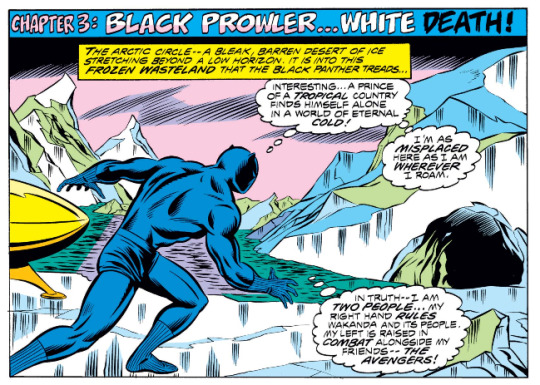
Meanwhile, Black Panther was sent to the arctic circle so he could wax philosophic about being a prince of a tropical country now alone in a world of eternal cold.
Truly he is misplaced wherever he roams.
Oh and Black Panther pretty easily finds his bomb too. Just sitting right inside an ice cave.
Which happens to be the ice cave ice lair of the biggest polar bear Black Panther has ever seen.
Life hack: You don’t have to pay natives to murder an Avenger if you just put a bomb in a polar bear cave. -taps temple-
So obviously, Black Panther is going to wrestle that polar bear. That’s just the inevitable path that this comic set him on.
Plus, the man once put Silver Surfer in an arm bar. He’ll wrestle anything. He’ll wrestle himself.
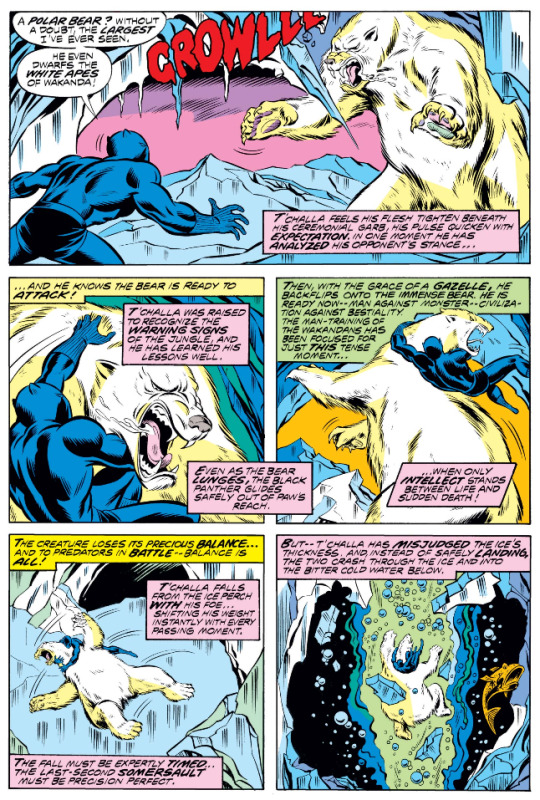
He kind of goofed up though. He forced the polar bear to stumble off of a ledge, probably to knock it out, but he misjudged the thickness of the ice.
So down they go into the freezing water.
With the cold numbing him and also a lack of oxygen, Black Panther has to abandon his plan to wrestle the bear.
Instead he breaks an icicle over bjorne’s head and then uses his face as a springboard back to the surface.
Like Cap, Black Panther too doesn’t want to kill. Its not the polar bear’s fault that its a killing machine. It needs to kill to eat. Black Panther just doesn’t want to be eaten. But he wishes him luck with the next meal that isn’t Black Panther.
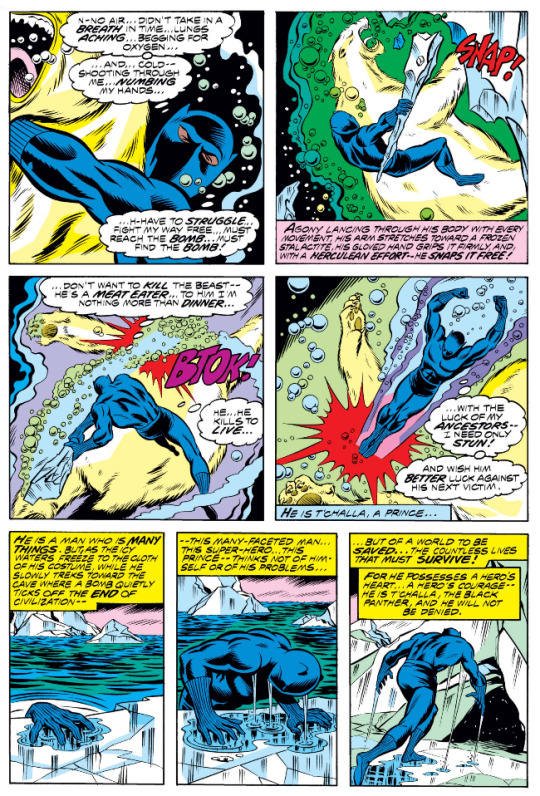
Also, damn, I don’t think he has a change of clothes and he’s soaked to the bone. Also his costume is explicitly freezing due to the water soaked into it. Walking away from this without hypothermia is a testament to something.
Black Panther’s willpower perhaps.
Chapter 4: Madness Over Moscow!
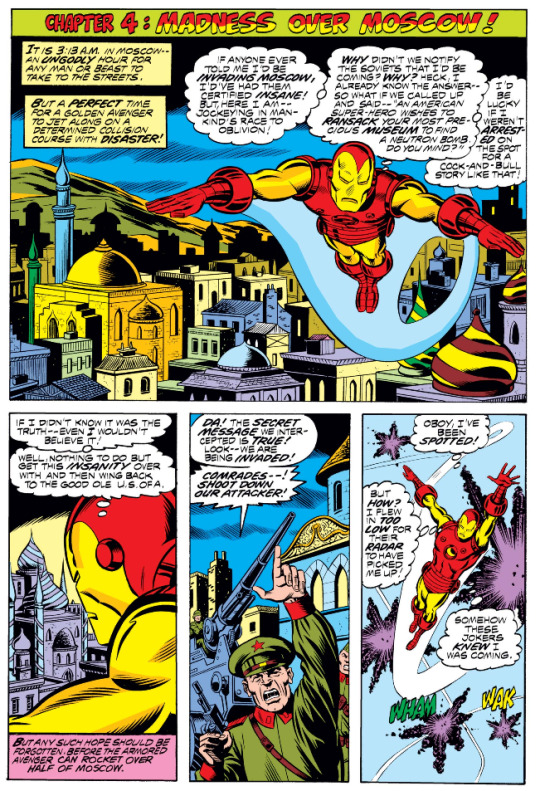
I notice that all three of these bombs were placed so that the Avengers would have to invade someone else’s turf to retrieve them. I wonder if that’s an overall thematic point or Beere’s just being a dick.
Since he wants the world to die with him and he isn’t a sympathetic anime girl with a cape, its probably the latter.
Iron Man actually wanted to call ahead and get the cooperation of the Soviets (because even if he saves the world from Beere’s bombs, ratcheting up the doomsday clock by annoying the Russians is hardly an ideal outcome) but realized that coming to them and saying hey can I ransack your museum for a bomb that my fellow capitalist countryman hid there wouldn’t come off well.
So he figures its better to never have to ask forgiveness than permission and he’ll sneak this shit.
Problem: Beere’s is a dick.
He set up secret messages for the Soviets to intercept that revealed Iron Man was going to invade the country.
So they were watching for Iron Man.
Specifically.
How did Beere’s know that it would only be these three Avengers? Geez.
Iron Man starts pondering along similar lines as Cap. Obviously Beere knew the Avengers would find his notes and go to retrieve the bombs. Its almost as if he wanted them to find his bombs. But why?
And why any of this? If the plan was for the world to die with him, why involve suicide by Avengers at all? Why not just quietly commit suicide? Why alert the Avengers at all to what was going on?
Iron Man finds the bomb but the museum is booby-trapped to prevent burglars from escaping.
Burglars don’t tend to have power armor though. I mean, yeah, they do. But mostly in New York.
So Iron Man just seals his mask from the knockout gas and OH YEAHs through the wall.
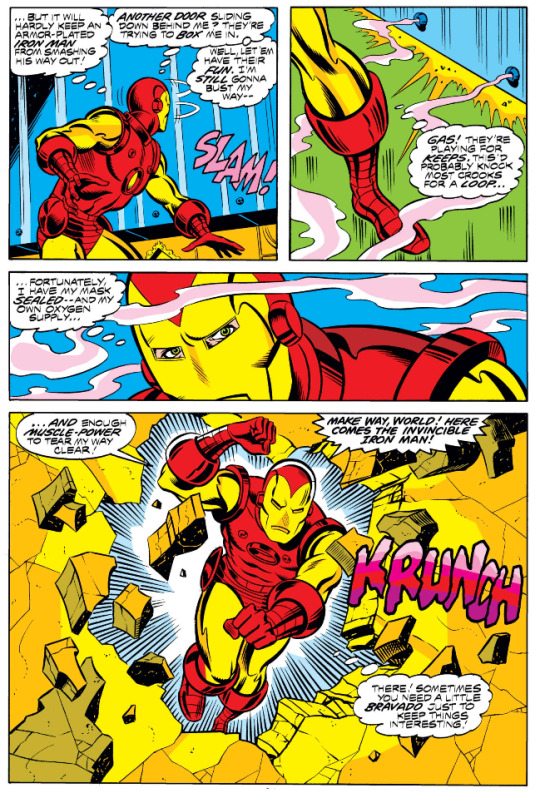
He retrieves the bomb but finds himself surrounded by Russian soldiers with heavy ordinance.
Given that, he asks if they want to hear a story.
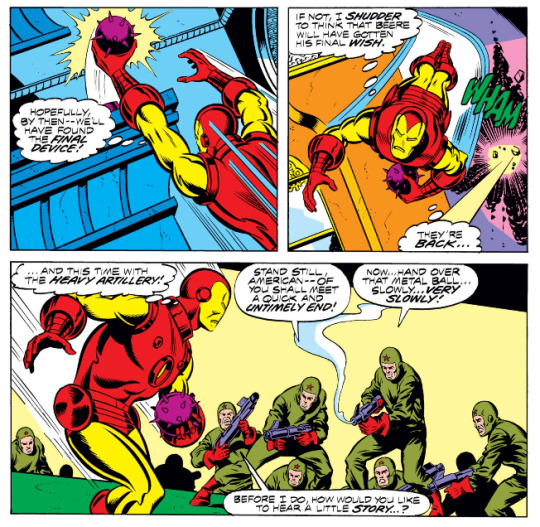
Chapter 5: A Fateful Decision!
Iron Man returns with his bomb!
There was a bit of a delay as he had to let Soviet officials examine the device but once they did they were more than willing to let him remove it from their country as soon as possible please.
So with all three bombs, its time to stick them together like in the blueprints.
Black Panther asks if they should follow Beere’s instructions. He is the guy that’s trying to blow up Earth. But Iron Man examined the spike balls and there’s no detonator.
Putting the devices together absolutely will not explode in their faces, guaranteed.
And it doesn’t.
Point to Iron Man.
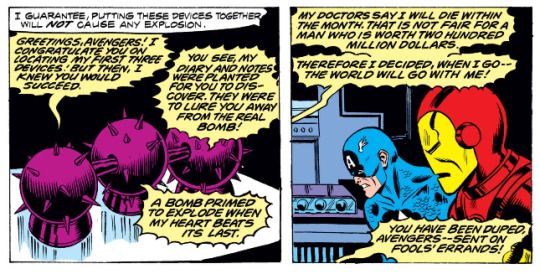
Instead, it plays a pre-recorded message. I guess they’re really spiky tape players.
Jason Beere: “Greetings, Avengers! I congratulate you on locating my first three devices! But then, I knew you would succeed. You see, my diary and notes were planted for you to discover. They were to lure you away from the real bomb! A bomb primed to explode when my heart beats its last. My doctors say I will die within the month. That is not fair for a man who is worth two hundred million dollars. Therefore I decided, when I go -- the world will go with me! You have been duped Avengers -- sent on fools’ errands! And now... now it is too late. I am dying, and the final bomb has been activated. Farewell, Avengers! We shall met again soon... in the great galactic gameroom -- beyond!”
Captain America slams his fist down on a computer bank in frustration for being snookered and maybe even smeckldorfed.
But not so fast: Beere’s may have been one step ahead but Iron Man was half of a step ahead of him.
When he examined the device, he realized it wasn’t a bomb but a tape player. And with that realization, he deduced most of Beere’s plot. And having heard the tape, he’s also deduced the location of the fourth and real bomb.
Because Beere’s is that kind of asshole. Like Iron Man said, he could have quietly committed suicide and nobody would have been wiser to his plan or able to stop it.
He wanted the Avengers to know, to try, and to fail. I don’t know why. The guy is a megalomaniac. Its not enough that the world dies with him. He wanted to beat the Avengers and have someone know how brilliant he was before he died.
So he couldn’t help but drop a clue because thats what people do, I guess, when they think they’re so much smarter.
The fourth bomb is primed to explode when Beere’s heart beats its last.
The bomb is attached to his heart.
And Beere’s didn’t reckon with something else either. Tony Stark keeps his heart troubles a secret. Nobody knows that Iron Man needs the chest plate to live, even though he keeps keeling over anytime anybody so much as lightly bumps into his chest during fights.
The chestplate is keeping Beere’s heart going. And its giving the Avengers time enough to try to disarm the bomb.
Unfortunately, after running some tests, Iron Man determines that the bomb can’t be removed. If they try, it will detonate.
So plan B.
The Avengers put Beere in a cryogenic chamber. Beere’s heart will be slowed down but non-stop.
Maybe one day they’ll find a way to remove the bomb. But until then, Jason Beere will live. Its no life but he’ll live.
Rather than die young, he’ll probably outlive all the Avengers.
There’s a real something feeling about that. Poignant or ironic or some other thing. Lash out in rage over dying young and end up frozen alive forever.
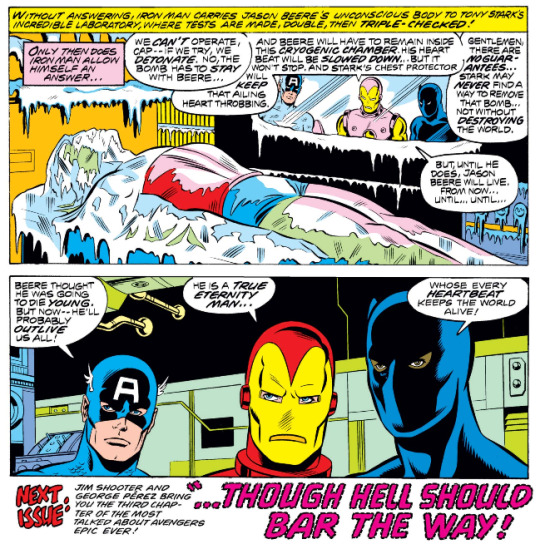
Iron Man: “He is a true Eternity Man...”
Black Panther: “Whose every heartbeat keeps the world alive!”
And I presume that Eternity Man is frozen to this day. Hopefully Tony Stark doesn’t go bankrupt like the three times that has happened and lose the ability to keep the cryogenic chamber going.
Maybe they’d better just have Jean Grey launch the entire facility into space so it can be safely detonated...
Anyway, that was filler.
It was okay filler.
Iron Man basically solves everything off-panel and wraps everything up in a hurry on the last page but so it goes.
I’ll forever wonder why the other Avengers didn’t get involved but there’s no refunds on opera tickets. And the Ring Cycle was playing.
Next time we get back to the Korvac Saga. Or as I like to think of it Part One of the Peter Henry Gyrich Ruins Everything Saga.
#Avengers#Eternity Man#Captain America#Iron Man#Black Panther#Essential marvel liveblogging#Essential Avengers#three crossword enthusiasts save the world#Black Panther will wrestle anything#Iron Man makes a good persuasion roll#Captain America just desecrates a sacred temple and assaults some sacred birds
6 notes
·
View notes
Text
Peace Corps Week in Europe | #33 | March 2020
At last came the fateful day I wished wouldn’t come so soon. My newfound Peace Corps friends and I left Mongolia.
Concluding Peace Corps Week 2020, which began the day I boarded that Peace Corps vehicle to leave my city of service, I take you along our misadventures crossing Eurasia and the Atlantic from Mongolia to America. Many goodbyes and hellos follow in this penultimate part of these evacuation stories from my life with Mongolia.
Departing Ulaanbaatar, Mongolia
Wednesday morning, March 4, standing and staring out the window of our hotel’s continental breakfast room, wearing my traditional Mongolian clothes, I felt like an elderly man moments away from losing a home he’s known for generations.
20 hours later, my departing group and those who came to see us off gathered together in hotel lobbies. We 49 left for the airport. I felt moved by an experience there. Then I reached our gate.
I reunited with the rest of our crew in the waiting area.
I saw the friendly sights of my senior sitemate and cohort friends, like the one I saw Monday and my Episcopalian buddy. I asked one to watch my belongings for a moment, then I returned just in time for boarding.
As we readied, one of my fellow Volunteers, my kind sitemate, asked if I'm ready to go home. "No," I abruptly told her.
But as we began walking toward our plane to board, I felt some excitement. Next stops, Moscow and Berlin. It'd be a long Thursday.
Settling In
I saw an open window row across my aisle, so I slid over. I later heard people weren’t supposed to change seats, but eh, no one said it to me. Nearby were both my cohort friend who visited me Monday afternoon and the senior cohort member who trained me my first weeks in Mongolia.
As we readied for takeoff, I saw out my left window workers in the cold with this huge hose blasting green chemicals on the wing. I’d never seen anything like it. But I also saw billowing what seemed mist, so I got the gist they were defrosting the wing. I think I vaguely recalled from middle school aviation classes that ice increases drag.
This seemed just like Mongolia that we’d need to defrost our wings for take-off. By take-off, our wing was still that weird light green...
Powerless
On the plane, my thoughts returned to a friend I helped before coming to our gate.
I remember her saying something as I left her group moments earlier, but I didn’t catch it. I still wanted to offer my support if she needed, though. Messaging her she’s welcome to chat if she wants, I noticed she tried to video call me after we boarded. Shortly after, a flight attendant asked me to power off my phone. I wasn't sure what to make of our missed communication.
I remembered earlier she said something like she’s been so angry and rude, and yet I didn’t mind. I was thinking, "I care about you," wishing I could lift her pain from her, like Simon and the Cross. But I couldn't. How could I help my friend who’d done so much for me? Again Lenten thoughts made me think to God’s Cross.
The hardest part for me was seeing my positive friend disheartened. I recalled how my friends, too, compared me to the sun. I wondered if my friends had felt as I did then, when my friends worried about me when I struggled through darkness. Friends in my undergrad years came through, so I guess I wanted to pay it forward. Compassion feels key.
But I’d noticed other Peace Corps friends around my friend’s end of the plane when I boarded. So I accepted as long as she had people to support her, she’d be alright.
Having done what I could, I focused on rest, now that my Wednesday’s all-nighter was through.
Moscow Mayhem
Hours after, we neared Moscow. Whatever green on our wings was gone. I rested little.
From the sky, visible buildings below reminded me of my city in Mongolia, just with tremendous more development. As we descended, our airport’s outskirts reminded me of Detroit’s view, too, but with more pines. I wasn’t sure what to make of comparing Russia’s capital to Detroit...
Over the intercom, I heard a third language after Mongolian and English. I initially assumed it was Russian. But after listening more carefully, it sounded like German. Our flight was merely passing through Moscow, with Berlin its final destination. So German made sense.
Also, while our plane taxied, I realized, I really can read Cyrillic! That felt cool.
But, dang, Moscow was rough.
We disembarked, followed long lines and went through with an immigration woman. All on our flight could only file through two immigration windows. Security spoke Russian and insisted nonverbally, too, we move incredibly fast through. But then we all clumped in this huge, warm mass of people in a chamber, waiting to get through security to get back on our flight. Some of us commented among ourselves we’d be faster if they didn’t have us do this in the first place.
I’d left Mongolia wearing that crazy six layers but took off and held two from the sheer heat in here. Around me felt weird, too, not seeing people wear face masks. All wore masks in Asia. But Peace Corps advised us to hide ours to minimize attention after leaving Mongolia.
Nonetheless, I made the best of our wait. I wound up in line beside one of my cohort’s Volunteers who came from Kansas City. We hadn’t spoken much during our service, but I valued our talks. I admired her quiet wisdom. Sometimes, especially in our cohort’s first week last June, I feared I came off too enthusiastic, which might be off-putting. But I feel types of people show me insights I don’t often find alone. I enjoyed our talk.
All reboarded by what would be considered nearly 1 a.m. in U.S. Pacific Time, half an hour late because of security.
As we returned to our seats, I recalled the warning from the Mongolian Christian I met at my Last Supper in my city of service. She said Moscow’s airport was terrible. I got what she meant, about how staff spoke no English, and we got poor service. Well, I hoped the rest of Europe wouldn’t be bad.
I tried to rest more, knowing I’d many more farewells.
Berlin Bittersweet Goodbyes
As we entered the German capital’s airspace, I loved seeing such traditional European architecture. Clouds added additional depth to my field of vision. I even saw a cool needle-looking building. (Do all super cities have needle buildings?)
We 49 in our Peace Corps squad hit the ground running in Berlin, with just under a couple hours to find our gates to Frankfurt and Amsterdam. More than about 30 were on to Frankfurt, leaving sooner, while my Amsterdam crew located our gate with little hassle.
So, my Amsterdam folks and I had a spare hour.
I walked with my senior sitemate and his friend, as we greeted every so often one of our friends passing on the opposite direction, to reach Frankfurt’s gate. We said last goodbyes of varying lengths, sharing camaraderie.
My senior cohort friends went to buy snacks, so I had downtime again. I spotted two more of my friends just beginning to wait in Frankfurt’s line. They weren’t to move ahead too soon, I felt impelled to see them off.
My friend I mentioned before seemed far happier now, seemingly back to the self I knew. She remembered I said days ago, I wanted to take a goodbye photo. My other friend, the Episcopalian buddy, commented it’s an honor when I want a photo with someone.
Maybe I didn’t show it, but I felt a little bashful from the comment. I just love remembering when I meet, see and part from wonderful people. Maybe the honor goes both ways.
The rest of my Berlin time, I joined my first-week roommate alongside one of my summer training clustermates. They sipped German beers while we chatted about our cohort’s murky future. My first-week roommate and I’d fly together into NYC, so he said I’d meet his parents. Neat!
An American in Europe
Boarding the Royal Dutch Airlines (KLM) flight to Amsterdam went rougher than expected.
Berlin’s airport transportation security felt displeased with my not knowing European security protocols. I qualified that it was my first time through Europe, but she wasn’t having it. Even the man coming behind me through security felt miffed. I tried not to take them personally. I figured this must be a cultural difference from America, where TSA verbally repeats everything to fliers.
KLM staff hurried me aboard the plane. As I passed down the aisle, my assortment of bags, haphazardly carabinered together, careened a bit. I felt shocked how Europeans visibly looked violated and perturbed when I accidentally bumped them. This felt way different from Mongolia, where people usually squeezed together in public places. I totally underestimated personal space changes.
I also considered the speed of business. Leaving Amsterdam, I felt Europeans I encountered expected me rushing way more than Asians did. The Europeans also weren't as forgiving for cultural ignorance. Still, they seemed more inclined to give reasons for their intentions. The flight crew asked passengers to sit but added so they could announce the cabin clear for take-off.
"Thank you for your attention,” I heard after an announcement. I always found it weird to hear Mongolian students conclude close presentations with that phrase. I realized it’s European.
My New British Friend
To my great relief, I sat beside an extremely understanding man on my flight.
He started by helping my frazzled self get situated. Then we chatted the whole flight. I explained I’m American, going through a Peace Corps Mongolia evacuation. He said he’s from the UK, but he’d worked in Berlin, the States, and Hong Kong. He understood feeling confused with new cultures. He was a facade engineer, specializing in glass for high-rise designs.
I asked my new friend what he thought of the States’ culture. Pleasantly, he described how he felt people in England didn't seem as concerned with ancestry the way Americans are. Americans he knew could name from which countries their ancestors came, when and from where. We discussed how this may relate to American identity formation, with its diversity.
Our conversation cooled me down from the spike in stress leaving Berlin. Onward to our final European stop—and more farewells.
After we reached Amsterdam’s airport, when I looked for a water fountain, my new friend reminded me we were in Europe. I laughed at my forgetfulness. Europe doesn’t have free public water the way America has.
Amsterdam, the Netherlands
We rushed through Amsterdam’s airport to reach our scattered next flights. More Peace Corps goodbyes began after immigration.
About half our group, maybe a dozen or so, split off for the gate to Atlanta. Sadly, this included my senior sitemate, who would return to Kansas City. I’d miss his cool collectedness about everything. The last three of our Peace Corps Mongolia group would be me, my friend and his friend, making our way to New York. As we hurried to our gate, a few more from the senior cohort accompanied us till they peeled off to theirs.
And generally, our gate felt more pleasant. A kind Dutch flight attendant jollily asked our senior cohort friend about a buildable Mongolian chess set he carried. Apparently the attendant had seen a traveler with one before. I mused, how cool this Netherlands airport sees such international goods and people.
I hoped I was done with security things. But two out of us three won the "random" extra check. The kind flight attendant gave a considerate laugh and assured us he doubted they were random. He gets them all the time. Dutch security swabbing my things felt like Chinese security with a different flavor.
But overall, I adjusted quickly back to much of western culture.
New Amsterdam, America
When I heard over the intercom about our departure, I heard our flight as though from Amsterdam to "New Amsterdam." Our transatlantic journey would take us through time.
Later on the flight, I felt I ate the best airline meal from the best airline inflight service I’d ever had. Seriously. Royal Dutch Airlines was by far among the finest I’d flown with.
Regarding politeness, I felt European to American norms and expectations are as Taiwanese to Mainland Chinese. People in Europe and Taiwan seemed to expect more politeness, for they gave more. I also thought flight attendants were either great actors or good at what they do. They seemed to genuinely want me to enjoy my meal.
Reverse Culture Shock in New York City
As we descended after sunset Thursday, March 5 into NYC. My heart rate sped up seeing so many cars still on the highways. So many cars, such wide streets.
After baggage claim, my cohort friend and I said our penultimate goodbye, to our senior cohort friend. Then my guy and I began wheeling out our luggage.
A security person questioned us about where we came from, which spooked me a bit. But my friend took it well and suggested to me the guy probably just felt curious.
Though last May, our cohort of more than 40 Americans flew out from JFK International to embark on our Peace Corps service, today just two of us arrived back here specifically.
My friend’s kind parents greeted us at once and brought us to their car to give me a lift to my hotel. I had that weird feeling like college graduation, getting to meet my friend’s parents. Great people. But wow, I guess when I’m adulting I don’t think I’d ever meet my pals’ folks.
Outside must have been around 9 p.m., but fatigue from crossing the Atlantic and Eurasia made that Thursday, March 5 feel later. Our group of now four chatted a bit about reverse culture shock. I commented on seeing around me these huge airport parking lots, big diverse automobiles, elevated highways and wide pothole-less roads. My friend’s folks even had this cool electronic toll collector—E-ZPass? Even thinking about toll roads felt Sci-Fi to me. As much as I tend to lament the States’ infrastructure compared to China’s, America still has so much infrastructure.
In a short while, we reached my hotel. We hauled my luggage from the SUV’s trunk. I really appreciated the folks’ kindness. Gosh, and I’d miss my friend. Amazing to think we were assigned each other’s roommates when we first reached Mongolia, and here we were, the last Peace Corps Mongolia Volunteers we’d see for a while.
Final Steps
And so, the week after I found out I’d leave my city in Mongolia, I’d already be back among family. In Mongolia, it’d be Saturday, March 7 by the hour of my return to Vegas. Peace Corps Week 2020 thus began the day I left my Mongolian city and ended the day I reached my American home of record.
In the upcoming evacuation finale, I’ll share with you the moving experience I had flying across the States in my final flight home. Along the way I bring together my favorite theme of all: identity.
You can read more from me here at DanielLang.me :)
#Peace Corps#Mongolia#memoir#story#memoryLang#God#goodbyes#Lent#NYC#gratitude#evacuation#Coronavirus#COVID-19#winter#Moscow#Berlin#Amsterdam#friends#culture shock#Catholic
0 notes
Photo

Justice League Very VERY flawed, with numerous problems, but it has enough entertainment value to make it worth a watch. 6.75/10 ***SPOILER TALK*** The Good: - The cast works very well together, and for the most part are all likeable. - Despite the little screentime spent to establish them, Aquaman, Flash, and Cyborg mesh naturally into this world. The decision to make Aquaman this hard-drinking dudebro type helps make him stand out from the others. Flash being made much younger here gives him an interesting contrast to the more experienced warriors of the team. Cyborg wrestles with his own existence and his ties to alien technology. I would watch movies about any of these characters! - Wonder Woman is still great here, and they try to explain why she was out of action for so long after WW1. Steve Trevor is her Bucky (what pushes her buttons... Bruce gets called an asshole for using Steve to chastise Diana) - Superman finally gets some good moments to be... Superman here, though they are few. Most of his scenes are memorable and fun, escpecially with the Flash. His whole engagement with the League after his resurrection was great. - The added levity here helps to break up the dreary look of the film. Though some of the quippiness was off-putting, for the most part it works. - This was a marked improvement upon Batman v Superman. But oddly, it could have used a longer runtime to fill in the numerous gaps in the story and help the movie flow more. The Bad: - The plot in general is garbage. Just... awful. There is only a bare minimum of a story here to get the League together. - Steppenwolf... sucks. He is Malekith from Thor 2 bad. He looks awful. His design and dialogue generic as hell. His motivation is mere cartoon villainy. It is at least somewhat satisfying to see the entire League beat the shit out of him. Superman and Wonder Woman pummel him good at the end. But he leaves no impression at all. Why did he have to be fully CGI??? What is with the DCEU and big, grey, CGI monster men as the final boss battle (Doomsday, Ares, whatever the fuck that thing in Suicide Squad was)??? - The beginning of the movie is incoherent, disjointed, and hard to follow. Much of the movie consists of just... scenes of stuff happening without a solid throughline or flow. The opening of the movie is a scene with Batman that immediatley devolves into Synder's incoherent numbing action. Wonder Woman gets a nice action scene fighting terrorists, but it is completely detached from the rest of the movie and serves no purpose. - They just sorta show Atlantis without much setup, expecting us to just know what is happening and who Mera is... She is just... there. No establishing scene or shot. Feels like a lot is missing. - Themyscira is shown again. Still bad green screening like in Wonder Woman. Now with more metal bikini armor... there is a scene of Steppenwolf attacking the Amazons for the Mother Box they have that goes on too long. - The Mother Boxes... more power cubes/boxes acting as McGuffins??? Nothing about them was explained very well. They were just... powerful evil things Steppenwolf wants. Cyborg can interact with them. They terraform worlds into Apokalips... yawn. Didn't Zod already do the terraforming villain plot? Only... better??? - The way the League resurrects Superman was... baffling. Batman just guesses the Mother box can bring him back? He and Wonder Woman start ranting about "ethics"??? Predictably, this revival invalidates his death in BvS. Also, they show everyone mourning Superman at the start. Nothing in the movies show that he inspired any hope at all. BvS showed everyone fearing him or distrusting him. They are relying solely on the audience's familiarity with his character's real world legacy to elicit sympathy. -To revice Supes, they have to do this elaborate procedure of dropping the box into the kryptonian fluid pool with Flash zapping it as it touches the fluid, but don't explain why they have to do it like that... why do they need to drop it?! They just leave their mother box unattended after Superman revives just so Steppenwolf can just steal it immediately??? Where did Cyborg even hide the third box where he could just pop up suddenly with it in his hands in the first place? If they are so important, why did the Atlanteans and Themysira just leave their boxes out in the freakin open in big rooms instead of... deeeeep underground in a damn vault in a bigger box surrounded by death traps and fire and lava and shit??? - Steppenwolf sets up base in Russia or some old soviet country. And the movie keeps showing this random russian family for some reason throughout (reminded me of Sokovia in Age of Ultron, but here it was done very sloppily). Also, this giant apokalips dome thing is built there and no one in any other country notices??? - Danny Elfman's score is forgettable save for two instances... when he calls back to his old 89 batman theme, and when he plays a few notes from the John Williams Superman theme... these callbacks are pointless, and serve only to remind you of better movies from a bygone era. - Good god... Superman's CGI mouth. It is in the FIRST SCENE of the movie. It looks terrible. It looks expensive. It looks unnatural. A fake mustache for Henry Cavill woulda saved them time and money. - The flashback scene explaining the three mother boxes felt like the Lord of the Rings prologue. A green lantern was shown... cuz fan service. - The entire action finale was more numbing Snyder bullshit full of bright explosions, gunfire, and single color theme (red in this case). There is no style or wit here. Just CGI overload. It gets better once the team confront Steppenwolf directly. - The movie looks kinda... ugly in general. - Lois again has little to do, but i guess its ok since this is a League movie and she's a glorified cameo. - Batman was pretty useless here. He gets his ass handed to him quite often. Suppose that is the point since his power is "I'm rich". Plus he's old now and doesnt move quite as fast. I still like Affleck as Batman. - ok, i gotta stop. Sounds like I'm being harsh on the movie but that is only because the Justice League deserves AMAZING rather then just "passable". This reeks of too many hands in the pot, and the result is a mess... but at least it is a fun mess. I would watch it again, unlike BvS or Suicide Squad, which i can barely sit through 10 minutes of anymore...
7 notes
·
View notes
Text
TAAAG
@cmcsatsuki aka sweetpie tagged me ^_^ OBRIGADO <3
Rules: Always post the rules, answer the eleven questions, then make up eleven more and tag eleven people.
Do you collect anything strange/funny, or have some quirk?
I love to collect “hobbies”, specifically learning new things eg taking up languages, widening my knowledge in politics/history/classical music just to name a few.
Favorite piece of art, why, what do you like about it?
Nell’s “The Day Before”.
The music video, the simple melancholic piano chords arranged with beautiful grief-stricken strings, heart-rending lyrics, the heartbreaking message of the video and song, the soulful, mourning vocal of Jong-Wan always tears my heart and leaves me, an unemotional robot, in tears, gasping and a heavy, broken heart.
Are you good at keeping secrets?
If I am trusted a secret, I most definitely will forget about it altogether. So yes, I forget and if I remember, I don’t act like I could recall it (except for the person who shares it with me).
Share something most people don’t know about you.
I act and am tough because I do not have another option.
Hows the weather, do you like it?
Cold affffff. But it’s alright I guess, this way I can go ice skating :)
Sun, rain or snow?
Each one has its charm. I am not able to decide.
Sour or sweet?
Sweet ^_^
What would bring you true happiness?
Helping people who are grateful for my support.
Which one are you, a flight or fight type of person??
Fight. I have always been on the more rebellious side and I need to voice out things that seem unacceptable to me.
When you take off your shoes, do you untie them or just push them off?
I am a lazy ass so I just push them off.
Do you consider yourself spontaneous, or a planner?
Definitely spontaneous. Give me new, unexpected things to get my brain working and you have my full attention. I get bored of old, pre-planned things.
Right now: where are you and what are you wearing?! /wiggling eyebrows
I am in my room in my red pyjamas.
If you could gather the 7 crystal balls and ask Shenron a single wish, what would it be?
I’m afraid I do not know what the 7 crystal balls are but I wish for my loved ones to be healthy.
What’s the closest book to you right now?
“Civil Procedure Law” from my boss, whom I won’t cite :D
That song that is the biggest guilty pleasure that you have! Tell me!
Fuck You Betta by Neon Hitch. Bitch I love this song lol
What was the most wtf thing I ever said to you?! :D
Nothing sweety, you’re lovely.
Who’s the famous person you would kidnap and take home with you if you could?
Gal Gadot. Or EXID’s Hani.
Pen-pineapple-apple-pen?
YEEEEEES.
When was the last time you laughed out loud and why?
Today during impro-theater, lol we have so many wtf-moments; today I was a mistress who killed the King cause I am a bad bitch and that was nice and we laughed out loud when I whispered “sorry sweety I’m the enemy”.
Most perfect romance in the world? Why?
I do not honestly know. If we are talking about fiction VIKTUURI but real life…uh…no idea friends.
Life role model?
My sister (burdens her family’s responsibilites, juggles frail health with two small kids, is an exceptional mom, works and is busy with housebuilding at the same time),
my ex-employer (the most badass, kind and genius lawyer, she is a mom, the most influential lawyer in the firm and is nice af at the same time),
my corporate law professor (genius in the three most difficult and important fields of law, lost his wife due to an illness, has two small kids, battles every day with a very painful medical condition and is the sweetest man on Earth and smiles always and always asks me about my well-being because he knows I’m battling.)
When are you coming to visit me?
Sweety thats a good question idkkkkk
What is your favourite colour?
Green ^^ And blue!
If you would be an animal, which one would you be? Why?
Apparently I’m like a deer and I kinda agree^^
Are you an early bird or a night owl?
Night owl, always.
Do you prefer to drive a car or to commute with public transports?
Trains are awesome when I have space, but cars are the second best:)
Which languages can you speak?
German, Turkish, English fluently, my Russian is already on a B1 (intermediate) level (YAAAAS), Japanese A2 (upper beginner), Korean and Spanish on a beginner level (A1). I also had years of Latin.
Which is the last movie you have seen?
I honestly do not remember because I do not watch movies.
In your opinion, which scientific discovery has had the most impact on our society?
Medical ones. But on a subjective level I’m most amazed about the fact that we do not know anything about dark matter which makes up 80 % of the mass of the universe.
Tell me 3 things that are typical in your country (for ex. food, music, tradition, and so on).
Austrians love to complain, and sometimes are quite contradictory; respect others when they are treated well. EG: Same sex marriage has been legalized by our constitutional court while only far-right winged parties govern the state and are losing their mkind rn lol
Which sports do you like? Do you do any Sport?
Ice skating and dancing :) I usually go running^^
Tea or Coffee?
OMG COFFEE MAN ALWAYS COFFEE
Define yourself with 3 words.
Curious, accepting, challenging.
New questions:
Babes do you enjoy classical music?
What advice do you have for your younger self?
If you could change one thing about the world, what would it be?
What are your favourite flowers?
Is there any place in the world that you’re dyiiiing to see?
Do you have a bucket list?
What language would you like to learn (next)?
Are you vegetarian?
(there are lotsa writers I have tagged) So sweetheart, what story would you love to write next about?
Do you want children sometime (maybe in the distant future)?
Would you rather dance or sing well?
I’m tagging my sweet gals: @invisible-spaz, @anussthingispossible, @carry-no-weight, @madlymiho, @themoonthatfellinlovewiththesun
3 notes
·
View notes
Text
Christmas Around the World
I’ve been waiting for almost a year to finally post this! Who knew that a year later, I would be finishing this post from Oxford St, surrounded by live Christmas carols and decorations that might blind the tourist eye.
Regardless on where you are or what you believe in, Christmas is always a special happy time to celebrate together with whom you love the most. Perfect occasion to drink and eat delicious feasts and fall into a food comma until the next day. Wasn’t that was resurrection was about? :D <3
I had the chance to spend December in different continents and countries, yet only 2 times I’ve spent Christmas away from home: one in HCMC and another one in Madrid.
So... how do people experience the most joyful time of the year around the globe??
Southern Hemisphere - Hot Sunny Summer
A) Uruguay - Montevideo & Punta del Este :: Home Lovely Home
Imagine this: 34 degrees Celsius, sunny beaches with mainstream, snowy decorations on every corner. Heavy, caloric food, heritage from cold Christmas spent in Italy or Spain, where our main ancestors have come from. Green countryside postcards and the white, sandy beaches are the Uruguayan equivalent of a snowy pine wood. Still, Santa, or as we call it, Papa Noel, wears the same winter outfit.
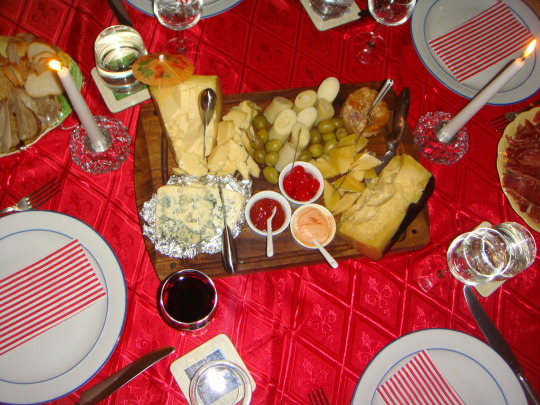
At home is always about the “mesa” service. It’s a ritual. My Dad loves to do it and he is the greatest host when it comes to cuisine “alla Tocchetto”. When I was little, I remember helping him with el Nono while eating some of the charcuterie while preparing it, before going to Church o “Misa de Gallo”, the ceremony performed on the Christmas Eve, with my Mom, la Nona and Aurora. The best part of the Misa is that after it, Christ was already born so I was able to open my presents earlier than 12 o’clock - hence, earlier than anybody else!- and at midnight we only concentrated on staring in awe the great fireworks.
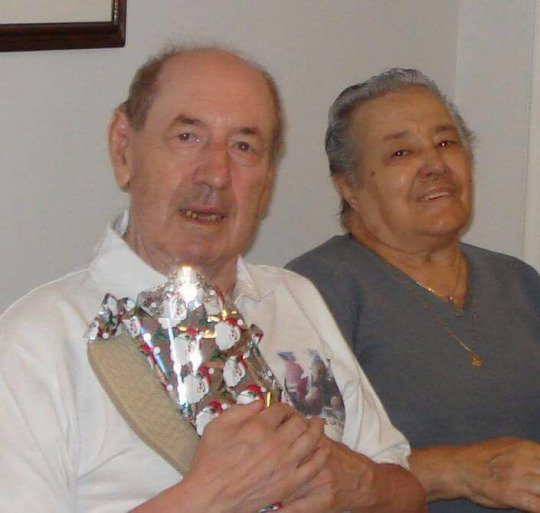
As a second dish, we usually have lechon or cold pigglet, with potatoe salad. Of course, we had turron, an almond and honey pie, as well as digestives and drinks, just enjoying them all-together. Sometimes, my godfather Beto also joined.

Over the last 10 years or so, we changed the setting to Punta del Este, where we started renting the penthouse of this little wonderful boutique hotel and had bbqs and a privileged views of the ocean and the peninsula. Although is summertime, you can always count on experiencing some wind in Punta, so we were always wrapped in blankets or wearing a light sweater.

Life happens and suddenly the guests at the table became less, with more empty seats, but with the same spirit and love. Those chairs were replaced by life long lasting friends like Henry & Carmen, once my lovely Turkish roommate Ayse joined, and it was a special occasion since it was her first and only Christmas at the time. I’m really looking forward for this 2017 Christmas since I haven’t been in Uruguay in December since 2015, whilst the year before I’ve spent it in Australia and Vietnam.
Western Europe:: The tradition begins
A) Spain: Madrid & Galicia & Barcelona

Last year was the first one that we spent it all together abroad, destination: Spain. There wasn't much to do in Madrid on the night of the 24th as we were expecting, but we did have two wonderful surprises: 1) we did our first DIY Christmas Sweater and 2) we discovered the amazing comfort food of “Migajas de Navidad”, meaning bread crumbs with everything else you can find: chorizo, meat, beans and veggies.

B) England - London

Stylish, classy, British. I had the chance to be there last weekend and it was the biggest snowstorm of the last 4 years! You could actually appreciate the white scenery across urban London, and that’s not common at all. Hot chocolate, warm mulled wine with cinnamon and pieces of fruit, as well as Pret-a-Manger soups are some of the British delights that keeps you warm during this wonderful time. Listening to random Christmas carols or singing for charity is something quite common on London Streets - cresting along lasting memory and stealing you a smile every single time.
C) Portugal - Lisboa & Porto
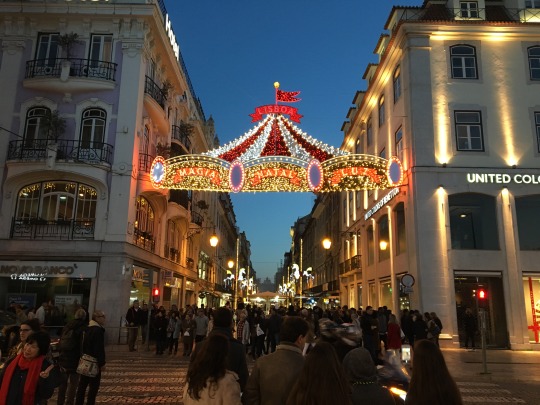
This is Christmas with Saudade. The Portuguese feeling of nostalgia is present in every food and on every corner. The lights are on but dimmed or faded out a little, with multiple Christmas Markets around, and the traditional Bolo Rei.

It was quite nice to arrive to our Airbnb and received, under a beautiful Christmas tree, three little gifts. We had such nice hosts and the location were superb: quite close to Praca de Pedro in Lisbon and a few blocks away from the main square in Porto. Such a lovely stayed and magical eve.
South East Asia:: Humid and Joyful
A) Singapore - Singapore
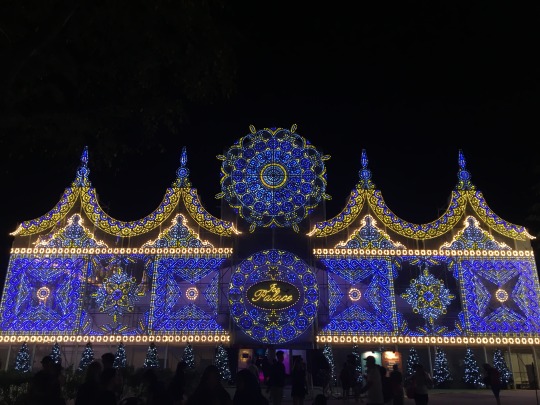
Another hot and sweaty Christmas. In the humid weather, creating a cool atmosphere is more than necessary. Modern Christmas Markets, in-store Christmas carols, full-on decorated avenues and what they call a “Christmas Wonderland” is ready to transmit the coziness of the most wonderful time of the year! The key stars of Singapore are Gardens by the Bay displays, with each year’s unique proposal -one year they even scheduled a live show of snow fall!- and Orchard Road, the most important and fashionable street where Christmas presents and purchases are made. Each store competes with each other to get the most amazing decoration, therefore more likes and pictures shared on Instagram, creating a wonderful and cheerful avenue where shopping becomes a North Pole visit.
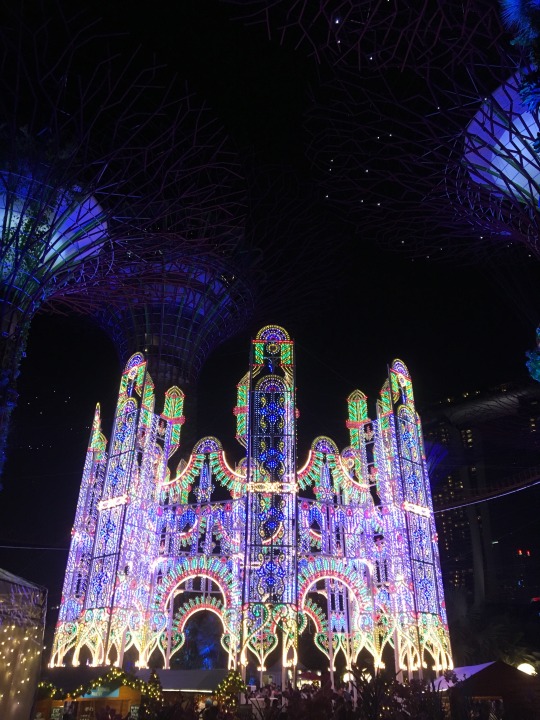
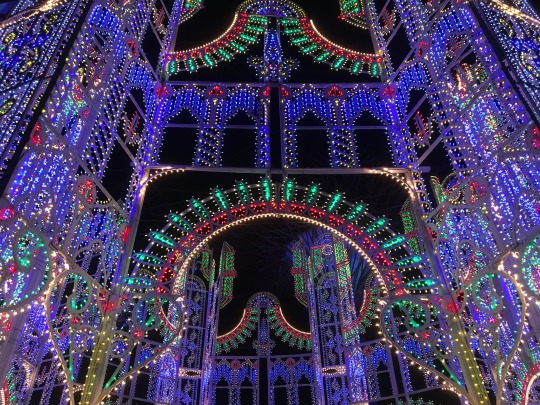
B) Vietnam - Ho Chi Minh City
I’ve spent a very unconventional Christmas here in HCMC. I went to church to respect my home traditions, went back home, walking down Hai Ba Trung. I exchanged gifts with my couple and I kinda received a wedding proposal in return. It was a very joyful moment. We hugged each other very closely and went to have dinner to this wonderful place we truly liked, I cant remember the name at the moment, but I do remember the amazing little red tea tiramisu served in a little plant pot. It was a Thai Place. We carried our little champagne bottles downtown and greet the passing by people with a “merry chismas” - the way they pronounced it. Every Vietnamese in Saigon was out driving around, taking pictures of the crazy motorbike scene of that night, having a very merry moment.
Northern Hemisphere - The B Side::: Where the real magic happens
A) Russia - Moscow & St Petersburg
I went to Russia during December and experienced the snowy magic of the ex USSR, but didn’t have the chance to experience Christmas Night itself over there. I guess Orthodox Christmas may vary a little bit from what one is used to, but I’m sure it would be amazing too.

I did had the chance to ice skate in front of the GUM, the amazing and huge commercial store located right next to Lenin’s mausoleum on The Red Square. It was quite a magical experience yet it made me think a lot. Everything was very Christmasy, very “Coca-Cola” if you’d like, since they do have this special Santa guy as well. Oranges are the Ortohdox symbol of prosperity and good luck that’s why they put it over the tree (same as the offerings done in Lunar ew Year in South East Asia). Chocolates, packed in a very unique, Russian way that resembles Russian architecture style tiles, are also served as treats for kids and adults alike.
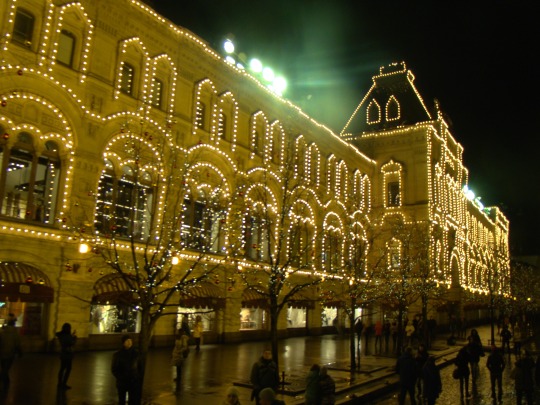
It was such a nice experience, drinking the warm mulled wine, riding a wonderful carrousel, singing Volga-Volga, remembering my Nono and toasting on his name. You feel the new Russian vibe but there’s something graceful and elegant about their Czarist past they can’t get rid of and you feel like a princess, waiting for Anastasia to show up and gossip about the past ballet or opera show.
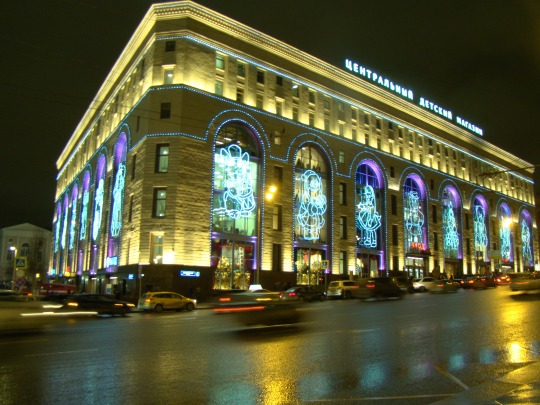
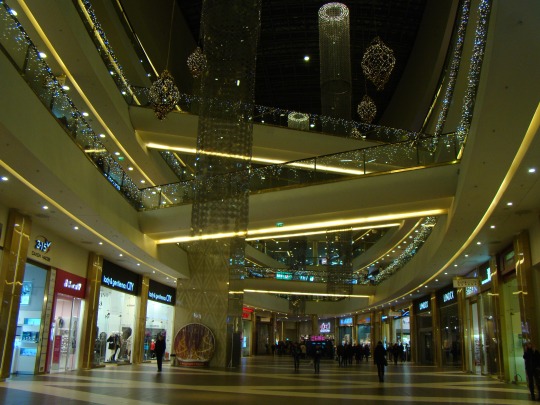
Shopping malls are also quite fantastic - and when it comes to discounts and trends, Russians know their stuff.
B) Finland - Rovaniemi
When hitting north, you better go big or go home. I went to Rovaniemi, in the highest, Northern part of Finland, on my way to Lapland. It was nice to make a stop there, not only to experience the Article Circle crossing line, but also and mainly because you can experience there real house of Santa Claus. Remember when you were a kid and you ended up taking pictures of yourself in every mall with a very dubious looking Santa? Well.. in this one, you can actually get the original picture after all!

You can visit Santa’s workshop and experience how the gifts are being made by the Elf team and you can learn the different Christmas traditions from around the globe. There’s an amazing souvenir shop where you can actually get your passport stamp by “the North Pole / Santa’s Workshop” but they getting more and more picky about that, since they don’t dare to stamp your actual passport anymore with a fake “country”. Yet, make sure to bring postcards or notebooks and get those stamps instead!
Bites & KMs Tip:::: SANTA CLAUS VILLAGE EXCLUSIVE!::::

You can also experience the deers and hopefully, if you are lucky, you can meet - or eat- Rudolf! There is a beautiful restaurant shaped as a tipi hut, North Pole style of course, where delicious feasts are being served. Don’t lose your time and go straight to the deer or even bear meat, you won’t regret it!
C) Sweden - Stockholm
If you imagine a white, snowy perfect Christmas, I bet Sweden and Stockholm is what’s on your mind and trust me, it will surely surpass your expectations.
My lovely Sverige. Saint Lucia’s weekend is by far the most festive one and the one you should not miss! Same week as the Nobel Prize ceremony, Saint Lucia is a very typical Swedish Tradition, where carols and candles are being lighted in honor of this Saint. They also do a very picturesque procession in Gamla Stan and in Skansen. The lovely Christmas Markets, with their handcrafted art and food are a delight you shouldn’t miss. Try some mulled wine to warm you up while watching the amazing city lights, making it even more charming than usual, rising up its splendor.


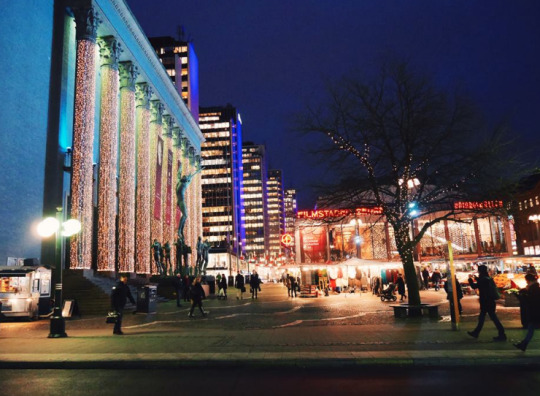


D) New York, New York - Mariah Carey’s Kingdom
It is indeed the most wonderful time of the year. With the incredible 5th Ave window displays, the fantastic and traditional Saks megastore decoration, as well as the Rockefeller Christmas Tree lightening, New York is fantastic during this time. All the parks around Manhattan and Brooklyn have Christmas Markets where to find delicious treats, fantastic gifts and charming people sharing the Christmas spirit. Macy’s and all the department stores play “All I Want for Christmas is You” and it’s the anthem for December. It makes me so happy. Download the Spotify playlist and enjoy Mariah, Wham! and Michael Bluble non stop.


Wherever you experience it, whatever you believe in, I do tend to agree with the song that says “It’s the most wonderful time of the year” since, regardless of the gift and shopping stress, family business and menu planning discussions, people are happier, people are more united, and people are having a blast with the one they love. So, Merry Christmas and Happy New Year from Bites &Kms, with love <3
#christmas#snow#summer#sverige#sweden#finland#singapore#vietnam#australia#puntadeleste#montevideo#spain#barcelona#travel#happiness#love#holidayseason
1 note
·
View note
Text
Blog post number 3
Hello!
So it’s been two weeks since our last post and in that time we’ve finished the trip across Western Russia and Siberia and made it across the Sea of Japan to (guess where) Japan! This might be quite a long post but will try not to go on too much!
So to pick up from where Mat left off, he eventually did get that game of chess out of the bear guide but we didn’t go for dinner in the end after finding some mystery baked goods at a station- on the platforms there are usually ladies with boxes of food to sell, with everything from ice cream to salads, from cucumbers to a kind of ravioli with potato or cabbage inside which seems to be a popular Russian dish. I think it���s called Vareniki. There are lots of these savoury donut - type things with sausages or other meat or cheese inside. At one point there were lots of ladies carrying armfuls of smoked / dried fish which everyone on the train seemed to love! Of course everyone also brings instant noodles as there is a samovar of hot water in each carriage so you can make a hot meal in a few minutes.
We were third class on the train which meant sleeping in the open car with around 50 other people, but everyone has their own bed and a place underneath for belongings, and the atmosphere on the train was much friendlier and more relaxed than I expected. It’s an interesting mix of people- some very old, some very young - on the first night a toddler was wandering up and down the train getting bits of food off different people, there were a group of young men on what sounded like a ‘lads lads lads’ type trip to Moscow being kept in check by an elderly lady (wearing a crocheted white cap- nana if you’re reading this, it reminded me of your sofa protectors!) sleeping beside them and later drunkenly advising us on how not to book a taxi in Irkutsk whilst also playing games with the kids in our ‘bit’ .
The train route passes through a lot of thick forest and by some small towns as you head out toward the Ural Mountains which mark the edge of 'European Russia’ and the beginning of Siberia. There are many vast modern cities with huge blocks of flats- apparently 85% of Russians live in the city now- and in between are very traditional-looking villages with usually one storey wooden buildings, often painted in turquoise, green or yellow, with a vegetable garden outside.
A lot of time is spent just gazing out of the window. It’s amazing how long you travel for before reaching anywhere - it really makes you appreciate how huge the country is and how isolated some of the places would have been before the railway was built at the end of the 19th century.
After 4 nights on the train we were glad to arrive in Irkutsk, near to Lake Baikal- Irkutsk was traditionally a trading/tax post for furs and other goods from Siberia, and is now a modern university city. An event which contributed to the development of Irkutsk was the arrival of some of the Decemberists - a group of very well educated Revolutionaries from Moscow who failed their attempted coup in 1825 and some of whom were exiled to Siberia, and here helped develop local education and living standards.
Irkutsk has lots of beautiful buildings, some of the traditional Siberian wooden style and other more grand stone buildings, many of which came with the development of the area at the time of the gold rush. We stayed with a host family in a large modern apartment block by the Angara River, they had both lived in this part of Siberia for most of their lives and had a very cute 1 year old daughter- they’d asked for an English children’s book so we took the Alfie and Annie Rose story book. One night we made them a Toad in the Hole and some Cairney scones which went down very well!
We arranged a trip to Lake Baikal from Irkutsk- Baikal is the largest freshwater lake in the world, and contains roughly a quarter of the entire planet’s freshwater. To be perfectly honest I wasn’t hugely excited about Baikal because I’ve seen plenty of lakes before (I mean come on, you can’t beat Windermere!) but it is truly breathtaking- the sheer vastness of the lake hits you as soon as you lay eyes upon it, with the snowy mountain peaks beyond, and very little in the way of anything on the shores aside from several small villages. That day we decided to hike up the Great Baikal Trail - a project set up by volunteers to make a path around the entire lake , yet to be completed - walk round to a beach on the other side of a hill overlooking the lake and back again (expecting this would take around 3 hours). 2 hours in we’d only just reached the top of the first hill , and our provisions consisted of an empty water bottle and a small bag of pine nuts so at this stage we decided to give up and go back, though we did get a fantastic view of the lake from the top, and it was a beautiful walk through thick, untouched woodland with nothing but a few Siberian style houses down by the lake. Back by Baikal we found some of the local food which is smoked fish from the lake in a kind of bread roll, and some shashlyk, I decided to go for a “swim” (it was extremely cold, after putting my ankles in I decided to abort the plan but the combination of peer pressure from some people watching from the beach and a particularly slippy rock was too much) and we walked back along the path by the lake , past the houses with people smoking fish on a fire outside. It was a very sunny and warm day, and very peaceful- it’s true what they say that Baikal does have a magical sense to it. I would love to go back one day.
The following day was the next leg of our trans Siberian trip- our host very kindly gave us a lift to the station, the family was going to their Dacha which is a kind of large allotment, usually with a summer house, which is a very popular thing in Russia for city dwellers. We had bought a second class ticket for this train as it wasn’t much more expensive and meant we got our own room. Our compartment was very nice and felt like true luxury after third class! I did some watercolour painting(thanks Shing!), we both read a lot, mat wrote a song, it was a nice few days. The scenery changed quite spectacularly from the dense forest and 'taiga’ of the more western parts and there were now huge purple mountains - we think on the border to Mongolia and China - with forest, small lakes and rivers and grasslands in the foreground.
After 3 days we reached Vladivostok, the end of the trans Siberian railway. It was very misty and grey the morning we arrived at the grand station, but we soon had a warm welcome from our host who picked us up and drove us over to their flat. Their place was at the top of a large block of flats overlooking the city and they made a really nice breakfast of tea, pine nuts, honey, aubergine pate and home made bread. They were really friendly and really into jigsaw puzzles ! In the evening Mat helped their 6 year old daughter (who apparently makes friends with guests by using them as a human climbing frame) complete one whilst I made the third Yorkshire pudding of our trip so far which is fast becoming a Yorkshire pudding tour of the world !
Vladivostok has been an important military base for centuries and was closed until the 90’s, so it’s a fascinating place to pass through! We stayed just one night and the next day left Russia for Japan, this time by sea!
The ferry to Japan was also a lot of fun, with its own night club, sauna and karaoke! There were lots of merry Japanese people partying and later sitting around on the floor playing a kind of game which we never quite understood. We met a great German couple from Berlin who were doing a similar trip to us but with bikes, and whilst the ferry stopped in South Korea we found a Korean restaurant and had an amazing lunch of a kind of ramen style dish, rice and lots of small dishes with different vegetables. South Korea was very beautiful with an extremely neat and tidy port town with lots of very clean looking factories and slick blocks of flats interspersed with farming fields, and lush mountains beyond. It was a baking hot day and the whole feel of the place was a world apart from Vladivostok ! There was a beautiful sunset from the deck of the boat that night, and just a few hours later we were in Japan which is a whole other story for another day- I’ll let Mat tell you about this place!
So all in all it’s been a fascinating trip across Russia to Japan, it’s been really interesting to learn about Russian history - which is helpful for understanding the rest of Europe and Asia- whilst travelling across it! We’re really looking forward to exploring more of Japan, China and Mongolia before beginning the journey back home through Russia once more.
Really missing you all back home and enjoying the updates!
Love Libby and Mat
PS haven’t included names of people we met as I wasn’t sure whether you’d want that - if you don’t mind, let me know !
1 note
·
View note
Text
Previews Galore
Not really a preview in the traditional sense because it’s already been posted. Part 2 of my little fan fiction on AO3 has been started. There were only supposed to be 2 parts to begin with but now there’s a third because this story wiggled its way in between parts 1 and 2. So here’s the first chap for “Whispered Promise” as it appears on the archive. Love getting the comments and such.
Full Story (or as much is actually posted) here
“Who else is there?” Dad asked skeptically. I covered the receiver and glanced at the only other person in the apartment with me desperately. He stopped moving.
“No one, dad.” I responded, trying to sound casual.
He sighed and chose to ignore it.
“I’m not paying for an apartment for you to mess around.” He reminded sternly. The man with me had since relocated to the kitchen but threw me a grin. “How was class today?”
“It was incredible, dad.” And it had been. We had dissected pigs in lab today and I had been anxious going into it. Something about my family, we tend to only face blood when we’re hurt or when we’ve hurt the thing bleeding. “The professor really likes me and he suggested I try and apply for a summer study with him.”
“That’s great to hear.” He sounded relieved. I knew that he had been anxious leading up to today as well. “So you think you’re starting to adjust a little better now? …Porsche? I told you, if you need us to come get you, we can. It’s not a problem.”
“I…I have to go.” The man beside me looked at me confused.
“Porsche…” Dad trailed off. “You need to talk to someone if you’re not feeling well about this. Your mother would probably like to hear from you? Maybe Sam, he’s in a closer field of study. Maybe he could help—“
“Dad it’s not about my studies.” I groaned.
“Your grandfather has tried calling you and says you ignore his calls.” He continued. “Maybe answer him? He can help you.”
“Dad, I don’t even know what’s wrong. I’m sure I’ll be fine.” I shivered and nodded towards the window. It was quickly shut. “It’s just a big adjustment, New York City and college.”
“How is the pack?”
“They’re fine. Oleksiy is very sweet, helpful. He’s taken Bran’s words to heart.”
“Everyone does.” Oleksiy was an old wolf, Ukrainian and probably from the Byzantine era. He never divulged just how old he was. The only reason I doubted my assessment was because Bran had implied he was younger than I’d assumed. “No one is bothering you? You’re eating?”
“I’ve still felt nauseous.” I admitted. “I’ve been eating though.” Truth be told, whatever was cooking in the kitchen was making me feel like throwing up.
“You’re too young to behave like this.” I knew he was worried, it didn’t even need to show in his voice. Wolves needed to eat, a lot. We metabolize much faster than the average person. Mix that with the general idea that we’re predators and not eating could mean someone goes missing somewhere.
Self control is especially tough in a city like New York.
“Tell mom and Bran that I’m fine.” I sat down on the couch and laid my head back. “I don’t need a visit. I’m just trying to make myself at home here.”
“It’s already the end of September.” Dad said cautiously. “Maybe you need to transfer?”
“I’m really ok.” I promised. “I’ll call you if I need something, ok?”
“I love you.” My dad said his goodbye.
“I love you, too.” And I hung up. I stretched up and again laid my head back, closing my eyes and taking a deep breath. The only visitor I had made his way over to me slowly, a little too quietly.
“Ready for dinner?” It was Bohdan’s voice from behind me.
“Mmmm,” I yawned.
“Maybe for bed?” He chuckled. I opened my eyes to be met with green ones. “I won’t stay tonight. I know you have to wake up early for class.”
“Thanks.” I closed my eyes again and felt lips press against my forehead. Bo was second in the East Hudson pack based out of Ukrainian Village. He was a little older than my father in that Slava was in WWII, I think. He wasn’t old, then, but he wasn’t young either and he was more than aware that what we were doing was a little too dangerous.
It was probably my fault, I’d not stopped it.
“What’s wrong, Vasilisochka?” He hadn’t moved from the spot behind the couch.
“I have a headache.” I sighed, “And I still feel very nauseated.”
He made a discontent noise. I knew my answer had been upsetting him over the past few days.
“Have you talked to a doctor?”
“Everyone is so quick to say I’m not ok.” I groaned and looked up to watch him walk into the kitchen and grab plates. Charles had helped find me a nice apartment, I found out that there had been some arguments about where I was going to live before I came here. Bran and my father had disputed who would pay for my housing, Bran’s argument being that he could just buy me the whole building and then I can make money for the rest of my life off of it. My father’s argument had been that, while that was very nice of him, I was still his daughter and I really only needed an apartment.
Charles had played the double agent, hunting for an apartment for both of them. He stealthily—I really think this was Anna and my mother’s doing—used both of their money to buy the whole building and the rest to furnish my apartment. In the end, both had met halfway rather begrudgingly but the deed had already been done.
Bohdan just shrugged at my overly-aggressive response and stirred the pot. The kitchen itself was a cliche, everything was white and it had a window to the fire escape where I’d placed a few potted flowers. They were dying, but they were there.
His dirty-blonde hair looked much more red in the sunlight that was disappearing behind him when he turned his head to look at something.
“Who’s Ben?” My iPad was charging in the kitchen and the message must have reached it before reaching the phone beside me.
Bran had texted and he’d asked if I had spoken to the blonde-haired man back home. The man that had actively sought to avoid me the majority of my senior year.
“He’s a wolf from my father’s pack and a friend.” I shrugged, trying not to come off in any way as being hurt by Bran’s message. Bo’s eyes searched mine for a moment and I obediently looked away after a few seconds.
The problem with werewolves was that you were dealing with two separate sets of instincts. Bohdan’s wolf was much less likely to be jealous, we weren’t mates and it was a complicated situation I was trying not to overthink. Bohdan himself was more likely to be jealous.
I hadn’t seen how these relationships ended, but I knew they were often difficult and they would more often than not end. My guess was they end badly.
“Is there a reason you need to reach him?”
“What’s for dinner?” I got up, ignoring Bran’s text and pushing past him in the small kitchen.
I almost threw up, I couldn’t even think about eating. Maybe I would have to call Sam, much to my distaste. I hadn’t even responded to texts from his daughter and she would be hurt to know I reached out to her dad.
“Porsche,” I wanted to tell him to just go away, but he had cooked so I couldn’t complain. “Porsche Vasilisa Hauptman.” I froze. “What is wrong?”
“Can we just eat?” I whispered. I tried not to jump at the feeling of his hand on my shoulder. “And you know you don’t get to try that with me.”
“My apologies, I forget.” I didn’t like when he tried that. This pack was a little too eager to pull rank and quick to forget it wouldn’t work unless I let it. It make me feel sticky when the magic ran over me.
I ignored him and sat at the table. Besides dad, the only other person from home I had spoken to had been my half-sister, Jesse. I had already known what I was doing was stupid and I obviously hadn’t changed the situation at all, but I needed to hear it from someone else. She would keep a secret unless she absolutely couldn’t.
“Do you want chamomile?” Bo reached for a mug. I hadn’t even heard the teapot go, my senses were getting dull from restlessness. “To settle your stomach?”
“Yes, please.” I sighed, taking a seat at the tiny kitchen table. I took the mug as it was slid to me and blew on it before taking a sip. “You put sugar in this?”
“You need to keep up your blood sugar somehow.” He reminded gently, taking the only other seat across from me. “The full moon is soon, little Vasya.”
This pack often chose to call me by my middle name, which surprised me at first. Much of the pack was of Ukrainian descent and my middle name was Russian. Vasilisa Mikulichna was a bogatyr and a woman. My understanding was that my mother had wanted to give me something of my father’s heritage since he chose Porsche. Vasilisa came to the court of Prince Vladimir dressed as a man in order to save her husband. The other option had been to name me after Princess Nastasya of Lithuania. My mother’s first problem had been the “of Lithuania” but an afterthought was the fact she was killed by her own husband in some sort of accident.
My mother didn’t want to name me with a fate, she isn’t superstitious to my knowledge but someone seemed to have pushed her into that one.
“You didn’t need ‘little,’” I mumbled, taking another sip. He looked up at me from his cup and I knew he was smiling from his dimples. “It’s already a diminutive, you didn’t need to double that.”
“You are little.”
“And Vasilisa was a warrior.” I reminded with a raised eyebrow.
“And your father is fourth in the country, your grandfather is the Marrok, you call his sons by uncle. You were raised to be a warrior.” It was then I realized he had slipped a plate in front of me as he had sat down. “But you don’t eat like one.”
“You speak like you are far older than you are.” I rolled my eyes. To appease him and everyone else, I picked up my fork and moved things around.
He just laughed.
2 notes
·
View notes